DOWNLOAD NEWS 2014/11
by Dan Morgan and Brian Wilson
Reviews are by Brian Wilson except where stated.
DL News 2014/10 is here and the Index of earlier editions is here.
Index for 2014/11:
BACH Cantatas 201, 205 and 213_Jacobs_HM Gold
BEETHOVEN Piano Concerto 4_Rubinstein_Beulah + CHOPIN, FRANCK
BLOCH Israel Symphony: Suite for viola and orchestra_Atlas_Naxos
BOËSSET Airs de cour_Poème Harmonique_Alpha
BOWLLY Al Music Maestro please_Beulah
BRAZILIAN Repertoire for Brass Quintet_São Paulo Quintet_BIS
BUSONI Late Piano Music_Hamelin_Hyperion
BYRD Masses_Westminster Cathedral_Hyperion
CHOPIN Piano Concerto 1_Rubinstein_Beulah + BEETHOVEN, FRANCK
Ballade No.1; Scherzo No.1_Rubinstein_Beulah Extra
COOKE Arnold String Sonatas_Stanzeleit etc_Naxos
D'INDIA Madrigali and Canzonetti_Concerto Soave_HM D'Abord
DOWLAND etc The Queen's Goodnight_Charivari Agréable_Signum
DVOŘÁK Symphony 6; American Suite_Gaffigan_Harmonia Mundi
ELGAR Music For Powick Asylum_Innovation Ensemble_Somm
ELGAR The Apostles_Hickox_Chandos
The Kingdom_Elder_Hallé
FITZGERALD Ella Legendary Recordings_Profil
FREDERICK The Great, etc._Music for the Berlin Court_AAM Berlin_Harmonia
Mundi
GOMBERT etc Music for Philip of Spain_Chapelle du Roi_Signum
HAYDN Cello Concertos + MONN Cello Concerto_Queyras_HM Gold
HAYDN String Quartets, Op.33_Cuarteto Casals_HM Gold
HAYDN Symphonies 49 and 80; Violin Concerto 1_von der Golz_HM D'Abord
HERRMANN Hangover Square; Citizen Kane_Gamba_Chandos
HERRMANN etc Music for Alfred Hitchcock_Mauceri_Toccata
HINDEMITH Nobilissima Visione (complete)_Schwarz_Naxos
HOWELLS Stabat Mater; Te Deum_Hill_Naxos
JOSQUIN etc. Le Chant de Virgile_HM D'Abord
KETÈLBY etc Wedgewood Blue_Sharples_Beulah
KHACHATURIAN Symphony 2; Spartacus excs_Khachaturian_Beulah
Spartacus Suites 1-3_Järvi_Chandos
Spartacus and Gayaneh excs_Temirkanov + RAVEL Daphnis Suite 2_Signum
KODÁLY Háry János Suite and excerpts_Ferencsik_Hungaroton
Háry János Suite; Concerto for Orchestra_ Ferencsik_Hungaroton
Concerto for Orchestra_Symphony in C_Kovács_Hungaroton
Concerto for Orchestra; Missa Brevis_Kodály_Beulah
Psalmus Hungaricus; Peacock Variations_Doráti_Hungaroton
Psalmus Hungaricus; Dances of Marosszék and Galánta_Iván
Fischer_Hungaroton
LASSUS Lagrime di San Pietro_Herreweghe_HM D'Abord
Ars Nova/Holten_Naxos
MOERAN Music for piano and orchestra_Frith_Naxos (see also 2014/1)
MOULINIÉ etc. Meslanges pour la Chapelle_Ensemble Correspondances_Harmonia
Mundi
MOULINIÉ L'Humaine Comédie_Poème Harmonique_Alpha
OFFENBACH Overtures_Scherchen_Archiphon (see also 2014/10)
PURCELL Funeral Sentences, etc_Herreweghe_HM Gold
RAMEAU Les Indes galantes_Reyne_Simphonie de Marais
(Suite)_Brüggen_Decca Originals
RAVEL Daphnis Suite 2_Temirkanov_Signum + KHACHATURIAN
RORE Missa Præter rerum seriem_Van Nevel_HM D'Abord
SCHUBERT An den Mond and other Lieder_Henschel_HM Gold
SCHUMANN Symphonies 1-4_Ticciati_Linn
Symphonies 2 and 3_Holliger_Audite
SMETANA Má Vlast_C Davis_LSO Live
STANFORD Organ Music 2_Nieminski_Resonus
STRAUSS R Complete Operas_Böhm, etc._DG
TELEMANN Grand Concertos 1_Schneider_CPO
TOMKINS Sacred Choral Works_Nethsingha_Chandos
Tallis Scholars_Gimell
Skinner_Obsidian
Summerly_Naxos
Higginbotton_CRD
Robinson_Hyperion Helios
VAUGHAN WILLIAMS Dona Nobis Pacem; Symphony 4_Spano_ASO Media
WAGNER Das Rheingold_Knappertsbusch Bayreuth 1957_Music & Arts
WALLACE Symphonic Poems_Brabbins_Hyperion Helios
Creation Symphony, etc._Brabbins_Hyperion Helios
WALTON Troilus and Cressida_Hickox_Chandos
WARLOCK Choral Music_Carice Singers_Naxos
Finzi Singers_Chandos
WOLF Goethe Lieder_Rogers, etc_Hyperion
McGreevey_Hyperion
WOLF Heine and Lenau Lieder_Genz_Hyperion
WOLF Italian Songbook_Lott, Schreier_Hyperion
WOLF Mörike and Goethe Lieder_Augér_Hyperion
WOLF Prometheus, Mörike Lieder_Banse, Henschel_HM Gold
Beulah Releases (UK)
Wedgewood Blue and other Light Music
Albert KETÈLBEY (1875-1959) Wedgwood Blue
In a Chinese Temple Garden
’Appy ’Ampstead
Sanctuary of the Heart
In a Persian Market
In the Mystic Land of Egypt
Bells across the Meadow
The Phantom Melody
New Symphony Orchestra of London/Robert Sharples
Hermann KOENIG Post Horn Galop
Royal Artillery Band/Major Sidney Hays
Luigi DENZA Funiculì, Funiculà
William HANDY St. Louis Blues
Band of the Coldstream Guards/Lt. Colonel Douglas Pope
Richard RODGERS Johnny One Note
Ted Heath and His Music
Duke ELLINGTON Caravan
Stanley Black and his Orchestra
Ignacio Herb BROWN You Are My Lucky Star
Werner Muller and his Orchestra
Rudolf FRIML Donkey Serenade
Johnny Keating Kombo
Kurt WEILL Mack the Knife
Rudi Bohm and his Band
rec. 1957-1962. ADD stereo.
BEULAH 3pd62 [70:41] – from iTunes or amazon.co.uk or amazon.com or 7digital.com (mp3)
 The
music of Ketèlbey, once so popular, has largely fallen out of favour
apart from walk-on parts on light music albums. There’s a Decca Phase
4 release of nine pieces (E4447862: RPO/Eric Rogers, with other
light music), another set of eleven on Chandos (budget-price Collect CHAN6676: Palm Court Orchestra) and a Marco Polo release in their
British Light Music series (8.223442 – download only) but the
Classics for Pleasure CD which I would otherwise have recommended, conducted
by John Lanchbery has disappeared; only Amazon UK have even the download (with Luigini Ballet Egyptien).
The
music of Ketèlbey, once so popular, has largely fallen out of favour
apart from walk-on parts on light music albums. There’s a Decca Phase
4 release of nine pieces (E4447862: RPO/Eric Rogers, with other
light music), another set of eleven on Chandos (budget-price Collect CHAN6676: Palm Court Orchestra) and a Marco Polo release in their
British Light Music series (8.223442 – download only) but the
Classics for Pleasure CD which I would otherwise have recommended, conducted
by John Lanchbery has disappeared; only Amazon UK have even the download (with Luigini Ballet Egyptien).
Yes, the music is often sentimental but we need a bit of sentimentality
sometimes and these recordings with Robert Sharples at the helm of the
New Symphony Orchestra are just the ticket. Recorded around 1959 in
good stereo and very well transferred, these tracks make a fine alternative
or addition to the Marco Polo or Chandos – see DL
Roundup August 2009 for both of these. It’s a shame that In
a Monastery Garden was not included – it was on the original Decca
LP and released separately on EP and it used to be on Decca The World
of Alfred Ketèlbey – you need the Marco Polo recording for that.
The music by the other composers makes an attractive and varied half-hour-long
bonus.
Classic Rubinstein
Frédéric CHOPIN (1810-1849) Piano Concerto No.1 in e minor,
Op.11 [32:56]
Ludwig van BEETHOVEN (1770-1827) Piano Concerto No.4 in G, Op.58
[29:59]
César FRANCK (1822-1890) Symphonic Variations, M46 [13:29]
Arthur Rubinstein (piano)
London Symphony Orchestra/John Barbirolli – rec. 1937 ADD/mono
Royal Philharmonic Orchestra/Sir Thomas Beecham – rec. 1947 ADD/mono
Symphony of the Air/Alfred Wallenstein – rec. 1958 ADD/stereo
BEULAH 1PD99 [76:24] – from iTunes or amazon.co.uk or 7digital.com (mp3)
 Logos
on the cover remind us that this album combines recording from the 78
rpm and vinyl eras. The Chopin, from 1937, sounds somewhat sub fusc,
thin and dry, though the ear adjusts to some extent and it’s mercifully
virtually free from surface noise. My principal benchmark for the Chopin
concertos is still Rubinstein’s later RCA stereo recording with the
Symphony of the Air and Alfred Wallenstein, or with the NSO and Stanislaw
Skrowaczewski, both now sounding much better on CD and download than
they ever did on LP.
Logos
on the cover remind us that this album combines recording from the 78
rpm and vinyl eras. The Chopin, from 1937, sounds somewhat sub fusc,
thin and dry, though the ear adjusts to some extent and it’s mercifully
virtually free from surface noise. My principal benchmark for the Chopin
concertos is still Rubinstein’s later RCA stereo recording with the
Symphony of the Air and Alfred Wallenstein, or with the NSO and Stanislaw
Skrowaczewski, both now sounding much better on CD and download than
they ever did on LP.
The opening tutti is heavily abridged, as was normal at the time
– as it was, the recording took up three 78 sides. I’ve no inherent
objection except to note that on his later recording Rubinstein (0902663044-2 – November
2010), like Ingrid Fliter and Jun Märkl on their recent Linn recording
with the SCO, which I very much enjoyed, gave it the full treatment
(CKD455 – review).
 Fans
of Rubinstein’s masterly Chopin are well served by Beulah this month,
with two Beulah Extra tracks: Ballade No.1 in g minor, Op.23 (6BX73)
and Scherzo No.1 in B, Op.20 (7BX73), recorded in stereo in 1958
– from eavb.co.uk.
Fans
of Rubinstein’s masterly Chopin are well served by Beulah this month,
with two Beulah Extra tracks: Ballade No.1 in g minor, Op.23 (6BX73)
and Scherzo No.1 in B, Op.20 (7BX73), recorded in stereo in 1958
– from eavb.co.uk.
The 1947 recording of the Beethoven concerto still sounds locked in
the 78 era, though it’s somewhat fuller than the Chopin. The performance
was good enough to survive into the LP era, at least in the USA where
Victor transferred it in 1952. I hadn’t expected this to be as special
as Rubinstein’s Chopin and I’m not sure that I’d go as far as Lionel
Salter who averred in 1949 that no-one need bother to record the work
ever again – they did and very good many of them are, including my own
benchmark from Stephen Kovacevich, the LSO and Colin Davis* – but it
certainly merits being heard alongside the Chopin. I haven’t heard
the Pristine transfer of this recording, which John Quinn thought truthful
(PASC165 – review)
but, like him, despite some reservations about the performance, I’m
glad to have heard Rubinstein’s performance.
* Decca Virtuoso 4783350, with Concerto No.5, or Decca 4786452,
Concertos 1-5, Diabelli Variations and eight Piano Sonatas, 6 CDs for
around £30, or Decca Eloquence 4805946, all the concertos, 4
CDs, all at budget price.
The Beulah album is rounded off with a 1958 stereo recording of the
Franck Symphonic Variations. When released in 1959 alongside
Saint-Saëns Piano Concerto No.2 the performance was accused of being
offhand and hurried. Certainly it’s a work which deserves to be given
full weight – that ‘symphonic’ in the title is no mere accident – and
this recording is a little more hurried than my benchmark, from Clifford
Curzon (Decca Legends E4663762 and various download-only permutations),
with Rubinstein stressing the playfulness of this music rather than
its symphonic nature, but I think the reviewer was unduly influenced
by the quality of the sound, described as thin but evidently much improved
on this Beulah transfer.
Music Maestro please
Al Bowlly with Lew Stone and his Orchestra, Carroll Gibbons and his
Orchestra, Ray Noble and his Orchestra
rec. 1931-38. ADD/mono
BEULAH 2PD36 [70:59] from iTunes or amazon.co.uk (mp3)
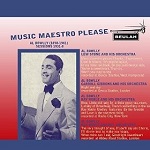 The
album takes its title from the opening number, the first of 21 tracks*
which Al Bowlly fans will need no invitation to purchase, while others
might profitably might make his acquaintance in these first class transfers,
with almost no surface noise apart from the odd rogue patch, yet as
full and undistorted a sound as could be expected for recordings dating
from the 1930s. My review copy came in lossless (wav) sound and the
iTunes and Amazon downloads won’t be quite of the same quality – when
will they both up their game from around 256kb/s? – but that shouldn’t
be too much of a problem. Amazon will confuse you by offering the album
on CD with a free mp3 rip but they have confused the download-only Beulah
with another album of the same name.
The
album takes its title from the opening number, the first of 21 tracks*
which Al Bowlly fans will need no invitation to purchase, while others
might profitably might make his acquaintance in these first class transfers,
with almost no surface noise apart from the odd rogue patch, yet as
full and undistorted a sound as could be expected for recordings dating
from the 1930s. My review copy came in lossless (wav) sound and the
iTunes and Amazon downloads won’t be quite of the same quality – when
will they both up their game from around 256kb/s? – but that shouldn’t
be too much of a problem. Amazon will confuse you by offering the album
on CD with a free mp3 rip but they have confused the download-only Beulah
with another album of the same name.
7 digital.com usually offer Beulah downloads in 320 kb/s sound but their
search engine is so hopeless that I couldn’t find this album among their
many Al Bowlly offerings.
* including Night and day, Little old lady, Lullaby of Broadway,
The very thought of you and Goodnight sweetheart.
Beulah Releases (Korea)
Aram Il’yich KHACHATURIAN (1903-1978)
Symphony No.2 in a minor (‘Bell’ Symphony) [52:09]
Spartacus – excerpts [23:01]
Vienna Philharmonic Orchestra/Aram Khachaturian
rec. 1962. ADD/stereo
BEULAH 1BX96K [75:11] – due shortly from kr.eavb.co.uk
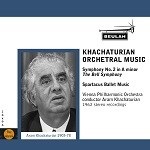 This
authoritative recording of excerpts from Spartactus remains available
on Decca Legends E4603152, with music from Gayaneh and
Glazunov’s The Seasons. The Beulah transfer is hardly inferior
and you may well prefer the coupling. The composer also recorded theSpartacus pieces again fifteen years later with the LSO – till recently available
with highlights from Gayaneh on Classics for Pleasure – review:
download from 7digital.com – and now incorporated in a 2-CD set with the Piano
Concerto and Violin Concerto (EMI 20th-Century Classics 6278902).
His somewhat shrill Melodiya recording of several of his own works is
available in a 5-CD Anniversary Edition from Qobuz.
This
authoritative recording of excerpts from Spartactus remains available
on Decca Legends E4603152, with music from Gayaneh and
Glazunov’s The Seasons. The Beulah transfer is hardly inferior
and you may well prefer the coupling. The composer also recorded theSpartacus pieces again fifteen years later with the LSO – till recently available
with highlights from Gayaneh on Classics for Pleasure – review:
download from 7digital.com – and now incorporated in a 2-CD set with the Piano
Concerto and Violin Concerto (EMI 20th-Century Classics 6278902).
His somewhat shrill Melodiya recording of several of his own works is
available in a 5-CD Anniversary Edition from Qobuz.
The first piece, Adagio of Spartacus and Phrygia, actually the
start of Suite No.2, was used as the theme tune of a BBC TV programme,
the Onedin Line, many years ago. Though the music has nothing
to do with the sea, it formed an effective background to the opening
shots of a sailing ship and it’s hard now to shake that association.
One current recording even has a ship on the cover. These authoritative
accounts still sound well but for alternative Khachaturian recordings,
please see below.
Harmonia Mundi Gold and Musique D’Abord Reissues
Harmonia Mundi have recently reissued a number of valuable older albums
– not very much older, in some cases – on their mid- and budget-price
labels. I’ve given links to eclassical.com downloads in all cases but
I recommend checking local prices for the CD equivalents against their
prices to see if they are competitive. In the UK that’s around £6.75
for Musique D’Abord and £7.50 for HM Gold.
Mozarabic Chant
Ensemble Organum/Marcel Pérès
D’Abord HMA1951519 [64:59] – from eclassical.com (mp3 and lossless)
Reviewed in 2014/1
Le Jeu des Pèlerins d’Emmaüs
Ensemble Organum/Marcel Pérès
D’Abord HMA1951347 [58:54] – from eclassical.com (mp3 and lossless)
Reviewed in 2014/1
Josquin des PRES, etc. Le Chant de Virgile
 Huelgas
Ensemble/Paul van Nevel – rec. 2001. DDD
Huelgas
Ensemble/Paul van Nevel – rec. 2001. DDD
D’Abord HMA1951739 [65:24] – from eclassical.com (mp3 and lossless) or stream from Qobuz
The principal ‘song’ of Virgil set here comes from Book IV of his Æneid,
from the dying words of Dido: Dulces exuviae, dum fata deusque sinebat,/ accipite hanc animam meque his exsolvite curis. ‘Sweet relics,
while the fates and the god permitted, accept this soul and release
me from these cares’. The words are set in different ways five times
(tracks 1 – Josquin, 2 – Mouton, 3 – de Orto, 13 – Vaet, 14 – Gerard
and 15 – Lassus).
Composers of other tracks include Willaert, Phinot and de Rore. Specialists
have reservations about van Nevel’s approach to renaissance music –
with one exception from an earlier style, all the music here is from
that period – but this is the only show in town and most of us will
enjoy it.
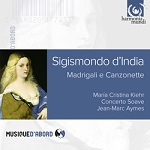 Sigismondo
D’INDIA (c.1582-1629) Madrigali and Canzonetti
Sigismondo
D’INDIA (c.1582-1629) Madrigali and Canzonetti
Maria Cristina Kiehr (soprano); Concerto Soave/Jean-Marc Aymes – first
released 2003.
D’Abord HMA1951774 [64:45] – from eclassical.com (mp3 and lossless) or stream from Qobuz.
These are beautifully performed accounts – a slight touch of hardness
which some will perceive in Maria Cristina Kiehr’s voice notwithstanding
– of music by a contemporary of Monteverdi whom many justifiably regard
as almost his equal.
The recording is good but the lack of texts, as with all D’Abord reissues,
even on CD, is especially regrettable in this case as with all the vocal
recordings.
Orlandus LASSUS (1532-1594) Lagrime di San Pietro (Tears
of St Peter); Motet Vide homo
Maria-Cristina Kiehr, Johanna Koslowsky (cantus), Simon Berridge, Gerd
Türk (alto), Hervé Lamy, Peter Kooy (tenor), Adrian Peacock (bass);
Ensemble Vocal Européen/Philippe Herreweghe – first released 1994. DDD
D’Abord HMA1951483 [58:56] – from eclassical.com (mp3 and lossless) or stream earlier release from Naxos
Music Library or Qobuz

Alternative recording: Naxos 8.553311 Ars Nova/Bo Holten
A powerful late work of intense fervour, based on St Peter’s lament
on his betrayal of Christ and usually regarded as Lassus’ swansong.
Now that the Herreweghe has been reissued at budget price, albeit without
a booklet of texts – there may be none with the CD, either* – this fine
recording competes on equal terms with the Naxos which I’ve listed.
* Naxos generously make the texts and translations available here.
Joseph HAYDN (1732-1809)
Symphonies No.49 (La Passione) and No.80, Violin Concerto No.1
Freiburg Baroque Orchestra/Gottfried von der Goltz (violin) – rec. 2008.
DDD
D’Abord HMA1952029 [69:13] – from emusic.com (mp3 and lossless)
 From
HMX2962029.
From
HMX2962029.
These recordings make the transition from budget price to budget price,
albeit with a different catalogue number. The original release made
the Violin Concerto the headline work; now the two symphonies earn the
large print. I thought the performance of No.80, which opens the proceedings,
enjoyable – period-instrument performance without the tears – but slightly
lacking in energy. Next von der Goltz directs and performs the solo
in an enjoyable account of the galant-style Violin Concerto.
No.49 certainly demands the passion that its name implies and it receives
it, though I know that some have thought the powerful sections too hard
driven: I don’t. You may also find the harpsichord continuo – absent
in No.80 and lightly present in the concerto – too insistent in this
symphony: again, I didn’t. The recording throughout is good.
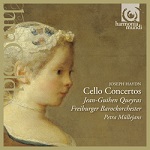 Joseph
HAYDN (1732-1809) Cello Concertos Nos. 1 and 2
Joseph
HAYDN (1732-1809) Cello Concertos Nos. 1 and 2
Georg Matthias MONN Cello Concerto in G
Jean-Guilhen Queyras (cello); Freiburg Baroque Orchestra/Petra Müllejans
First released 2004.
HM Gold HMG501816 [68:37] – from eclassical.com (mp3 and lossless)
These performances either offer perfection or sound raw and uningratiating,
depending on your take on period-instrument performances.
My own feelings incline more towards the former than the latter.
Joseph HAYDN (1732-1809) String Quartets, Op.33/1-6, HobIII/37-42
Cuarteto Casals – rec. c.2008?
HM Gold HMG502022.23 [1:47:07] – from eclassical.com (mp3 and lossless) or stream from Qobuz or Naxos
Music Library
 Previously
available as HMX2962022.23, released 2009 and still available
from some dealers at budget price.
Previously
available as HMX2962022.23, released 2009 and still available
from some dealers at budget price.
I liked the Cuarteto Casals’ most recent Haydn recording, of the Seven
Last Words (HMC902162 – 2014/3),
though acknowledging that some would prefer slower, more reverent versions.
Swift but not over-brisk performances are more suited to these Op.33
quartets, especially the so-called ‘Joke’ Quartet – the Italian word
for ‘joke’, scherzo, being a distinguishing mark of all six works
here. These are period-instrument performances, with all repeats taken,
but far from pedantic.
Unless you can still find the original CDs at budget price or are prepared
to accept mp3 only from 7digital.com,
eclassical.com’s price is very competitive. Some may prefer the rival
period performances from Mosaïques Quartet on Naïve/Astrée E8801 (download only). That apart, Cuarteto Casals go to or near the top
of the tree.
Wolfgang Amadeus MOZART (1756-1791) Symphonies 35 and 36
Prague Philharmonia/Jiri Belohlávek - rec. c. 2004. DDD
D’Abord HMA1951891 [63:30] – from eclassical.com (mp3
and lossless) or classicsonline.com (mp3)
or stream from Naxos Music Library
Reviewed in 2014/7
Serenade No. 6 in D, K239, Serenata Notturna [18:25]
Divertimento in D, K136, ‘Salzburg Symphony No. 1’ [16:25]
Divertimento in B-Flat, K137, ‘Salzburg Symphony No. 2’ [12:12]
Divertimento in F, K138, ‘Salzburg Symphony No. 3’ [12:16]
Freiburg Baroque Orchestra/Petra Müllejans
First released 2004. DDD
D’Abord HMA1951809 [59:18] - from eclassical.com
Reviewed in 2014/4
 Cipriano
De RORE (c.1515/16-1565) Missa Præter rerum seriem
Cipriano
De RORE (c.1515/16-1565) Missa Præter rerum seriem
Huelgas Ensemble/Paul van Nevel – released 2003.
D’Abord HMA1951760 [64:34] – from eclassical.com (mp3 and lossless)
Unless you object to van Nevel’s tendency to soup up the music, this
budget reissue makes a fine alternative to The Tallis Scholars, most
economically purchased as part of Gimell GIMBX302, 4 CDs at budget
price – review and October
2011/2. As with all vocal releases in the d’Abord series, the lack
of texts – provided by Gimell – is irksome.
Don’t forget the recording by The Brabant Ensemble and Stephen Rice
of de Rore’s Missa Doulce mémoire and Missa a note negre (Hyperion CDA67913: Recording of the Month – review and 2013/11).
Ástor PIAZZOLLA (1921-1922) Concerto for bandonéon, etc.
Josep Pons
HM Gold HMG501595 – reviewed 2014/10
Henry PURCELL (1659-1695) Funeral Sentences, ‘Bell’ Anthem, Te
Deum*
Hail! Bright Cecilia, Welcome to all the Pleasures**
Tessa Bonner, Patrizia Kwella (sopranos), Kai Wessel (alto), Paul Agnew,
William Kendall (tenors), Peter Kooy (bass)*
Susan Hamilton, Siri Thornhill (sopranos); Robin Blaze; Martin van der
Zeijst (altos); Mark Padmore (ten); Jonathan Arnold, Peter Harvey, Jonathan
Brown (basses)**
Collegium Vocale Gent/Philippe Herreweghe
– rec. c.1993*/1998**. DDD
HM Gold HMG508462.63D [2:20:25] – from eclassical.com (mp3 and lossless)
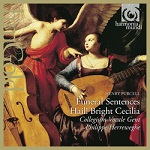 The
first CD of this set is a reissue of HMC901462 – reviewed in 2014/3 – with the misleading words Musique funèbre pour la Reine Mary omitted from the cover: what we actually have are the Funeral Sentences
which Purcell composed in the 1670s or early 1680s, framed by the Canzona and March from his music for the funeral of Queen Mary composed near
the end of his own life. Z78b, however, still seems to be wrongly identified
as Z78c.
The
first CD of this set is a reissue of HMC901462 – reviewed in 2014/3 – with the misleading words Musique funèbre pour la Reine Mary omitted from the cover: what we actually have are the Funeral Sentences
which Purcell composed in the 1670s or early 1680s, framed by the Canzona and March from his music for the funeral of Queen Mary composed near
the end of his own life. Z78b, however, still seems to be wrongly identified
as Z78c.
The second half of this two-parter comes from HMC901643, released five
years later and with different, mostly Anglophone, soloists. Unless
you go for the Hyperion complete set of Purcell’s church music, the
Harmonia Mundi reissue is well worth considering, but this is one instance
where shopping around is recommended: eclassical.com’s price of $25.28
may be attractive for US purchasers but the 2-CD set is on sale in the
UK for around £11.25, almost £4 less at current exchange rates.
Jean GILLES (1668-1705) Requiem [42:04]; Diligam te
Domine [24:36]
Agnès Mellon (soprano), Véronique Gens (soprano), Howard Crook (tenor),
Hervé Lamy (tenor), Peter Kooy (bass); La Chapelle Royale/Philippe Herreweghe
– rec. 1990. DDD
HM Gold HMG501341 [67:40] – from eclassical.com (mp3 and lossless)
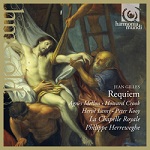 No
texts with any of these HM downloads, but that of the Requiem is ubiquitous, while that of Diligam te (Psalm 17 (18) 2-11)
can be found here.
No
texts with any of these HM downloads, but that of the Requiem is ubiquitous, while that of Diligam te (Psalm 17 (18) 2-11)
can be found here.
Herreweghe made a fine earlier recording of the Requiem for DG
Archiv in 1981 and that version has reappeared on Brilliant Classics 93890: Bargain of the Month – review.
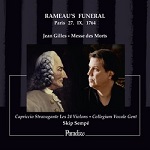 Eclassical.com
also offer a recording on the Off the Record label in which Skip Sempé
conducts the Collegium Vocale Gent and Capriccio Stravagante in a reconstruction
of Gilles Requiem as it might have been performed at the obsequies
of Rameau in September 1764, with some of the latter composer’s own
music interspersed. Once again, the lack of a booklet of notes and
texts is irksome. (PA0013 [63:25] – mp3, 16- and 24-bit lossless.)
Eclassical.com
also offer a recording on the Off the Record label in which Skip Sempé
conducts the Collegium Vocale Gent and Capriccio Stravagante in a reconstruction
of Gilles Requiem as it might have been performed at the obsequies
of Rameau in September 1764, with some of the latter composer’s own
music interspersed. Once again, the lack of a booklet of notes and
texts is irksome. (PA0013 [63:25] – mp3, 16- and 24-bit lossless.)
As Gilles Requiem is rather operatic in style, the inserted excerpts
from Rameau don’t sound too much out of place. Both versions are well
performed and recorded, but I’d plump for the Harmonia Mundi as offering
two works by Gilles. It appears to have been the first version to appear
without the Campra accretions when it was released, whereas Sempé includes
the extra orchestration which had accumulated in the 60 years between
the music’s composition and Rameau’s death.
 Johann
Sebastian BACH (1658-1750)
Johann
Sebastian BACH (1658-1750)
Secular Cantatas: Geschwinde, ihr wirbelnden Winde, BWV 201, Der zufriedengestellte Äolus: Zerreisset, zerspringet, zertrummert
die Gruft, BWV205 and Lasst uns sorgen, lasst uns wachen, BWV213
Efrat Ben-Nun, Maria Cristina Kiehr, Katharina Kammerloher (sopranos),
Andreas Scholl 9alto), Christoph Prégardien, James Taylor, Kurt Azesberger
(tenors), Roman Trekel, Peter Lika, Klaus Häge (basses); RIAS Kammerchor;
Akademie für Alte Musik Berlin/René Jacobs – rec. c.1995. DDD
HM Gold HMG501544.45 [2:14:06] – from eclassical.com (mp3) orclassicsonline.com (mp3) or stream from Naxos
Music Library
Though Masaaki Suzuki on BIS is working through the Bach secular cantatas,
there’s room for this reissue of René Jacobs’ older recording of three
of them. Please see 2014/8 for my joint review of this HM Gold reissue and Suzuki’s recent recording
of BWV205 and 207.
Franz SCHUBERT (1797-1828) An den Mond and other Lieder
Dietrich Henschel (baritone); Helmut Deutsch (piano) – first released
2005. DDD
HM Gold HMG501822 [75:53] – from eclassical.com (mp3 and lossless) or classicsonline.com (mp3) or stream from Qobuz or Naxos
Music Library
 The
opening Der Wanderer an den Mond, D870, and track 16, An den
Mond in einer Herbstnacht, D614, provide the title for this collection
of night-themed lieder. Opinions were mixed when it first appeared,
ranging from almost unalloyed delight to a feeling that Henschel and
Deutsch didn’t quite penetrate the Innigkeit of some of the songs.
I incline more to the former viewpoint. Try Meeres Stille (tr.10)
if you have any doubts about their ability to capture the mood.
The
opening Der Wanderer an den Mond, D870, and track 16, An den
Mond in einer Herbstnacht, D614, provide the title for this collection
of night-themed lieder. Opinions were mixed when it first appeared,
ranging from almost unalloyed delight to a feeling that Henschel and
Deutsch didn’t quite penetrate the Innigkeit of some of the songs.
I incline more to the former viewpoint. Try Meeres Stille (tr.10)
if you have any doubts about their ability to capture the mood.
The beauty of Henschel’s singing is not in doubt, especially by comparison
with the earthier but equally accomplished tones of Mathias Goerne,
whose continuing cycle is also released by Harmonia Mundi: on the first
half of Volume 8 Goerne is, like Henschel, accompanied by Helmut Deutsch,
with Eric Schneider on CD2 (HMC902109.10 – review).
If you already have a basic collection, such as Dietrich Fischer-Dieskau
with Gerald Moore (EMI Red Line 2322802 or DG 4793074,
3 CDs) or with Jörg Demus and Gerald Moore (DG Originals E4577472),
all at budget price, the Henschel reissue could be a logical next step,
especially as he shares many of F-D’s vocal qualities.
In one of those pricing paradoxes that I’ve stopped trying to resolve,
classicsonline.com charge £4.99 for their mp3 download – significantly
less than eclassical.com, but the latter also offer lossless at the
same price – yet ask £7.99 for some of the (supposedly) less expensive
D’Abord albums. Neither includes texts but these are not hard to find
online.
Hugo WOLF (1860-1903) Prometheus
Mörike Lieder; Spanisches Liederbuch; Goethe Lieder
Juliane Banse (soprano), Dietrich Henschel (baritone)
Rundfunkchor Berlin; Deutsches Symphonie Orchester Berlin/Kent Nagano
– rec. 2005. DDD
HM Gold HMG501837 [69:12] – from eclassical.com (mp3 and lossless) or stream from Qobuz
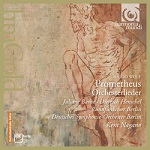 The
24 songs which Hugo Wolf orchestrated fit neatly onto a CD. These convincing
and skilful performances show that the orchestrations add significantly
to the piano versions and, with very good recording, as heard from the
lossless download, only the lack of texts and translations – included
with the CD, I understand – prevents a whole-hearted welcome. No matter
– the texts of all Wolf’s song settings, in various languages, can be
found online here.
The
24 songs which Hugo Wolf orchestrated fit neatly onto a CD. These convincing
and skilful performances show that the orchestrations add significantly
to the piano versions and, with very good recording, as heard from the
lossless download, only the lack of texts and translations – included
with the CD, I understand – prevents a whole-hearted welcome. No matter
– the texts of all Wolf’s song settings, in various languages, can be
found online here.
The album takes its name from the final song in the Goethe cycle, Prometheus,
the man punished by the gods for bringing fire to the earth, a work
of almost operatic proportions in this orchestral version.
If you want the complete Goethe Lieder, with piano accompaniment,
by common consent Joan Rodgers, Stephen Genz and Roger Vignoles are
your go-to ensemble (Hyperion CDA67311/2: review – from hyperion-records.co.uk,
mp3 and lossless, with texts). Indeed, Hyperion could be your one-stop
shop for Wolf, with Arleen Augér’s fine account of a selection of the Mörike and Goethe Lieder on CDA66590, Felicity Lott and Peter Schreier with Graham Johnson
in the Italian Song-book (budget-price CDH55385 –
review and August
2012/1), Geraldine McGreevy and Graham Johnson in Goethe Lieder on CDA67130,
Stephen Genz and Roger Vignoles in Heine and Lenau Lieder (budget CDH55389 – August 2012/1) and Stephen Genz and Bernarda Fink in the Eichendorff
Lieder on budget-price CDH55435.
***
Music for Philip of Spain
Nicolas GOMBERT (c.1495-c.1560) Dicite in magni [7:14]
Fernando de las INFANTAS (1534-c.1610) Domine ostende [6:11]
JOSQUIN des Pres (c.1450-1521) Nimphes nappés [3:11]
Jean RICHAFORT (c.1480-after 1547) Missa pro defunctis : Introit [6:22]; Kyrie [4:30]; Gradual [6:40]
Francisco GUERRERO (1528-1599) Gradual [4:43]; Tract [3:21]
Jean RICHAFORT Missa pro defunctis : Offertory
[9:23]; Sanctus [2:29]
Alonso LOBO (c.1555-1612) Versa est in luctum [5:16]
Jean RICHAFORT Missa pro defunctis : Benedictus [1:50]; Agnus Dei [3:23]; Communion [3:20]
Plainsong Dismissal [0:21]
Alonso LOBO Libera me [8:29]
Chapelle du Roi/Alistair Dixon
rec. St Jude’s Hampstead, London, 11-13 May 1998. DDD
pdf booklet with texts and translations included
Signum SIGCD005 [78:41] – from classicsonline.com (mp3)
(see review by Peter Wells)
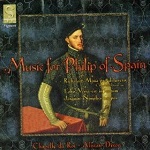 I
mentioned this recording some time ago in connection with my review
of another recording of Richafort’s Requiem on Harmonia Mundi
d’Abord, a budget-price release well worth considering.
I
mentioned this recording some time ago in connection with my review
of another recording of Richafort’s Requiem on Harmonia Mundi
d’Abord, a budget-price release well worth considering.
In the absence of knowledge of the music performed at the Requiem of
King Philip of Spain, Signum and Chapelle du Roi have put together a
programme of what it might have been, though they are at pains to point
out that it’s by no means an attempt at a liturgical reconstruction.
It is known that a Gradual and Tract by Guerrero were sung and that
the mass was based on Circumdederunt me and Richafort’s of 1532
is based on that cantus firmus, though it was well and truly
obsolete by 1598 – it didn’t include a Tract as required by the new
Tridentine rite, hence the inclusion of the Guerrero.
In any event, what we have is both convincing and well performed, with
spacious tempi, and well recorded. The only oddity concerns the strange
decision to insert Lobo’s Versa est in luctum between the Sanctus and Benedictus. It’s a work well suited to a funeral but not
at that point: Sanctus and Benedictus go together like
horse and carriage.
In addition to the Harmonia Mundi version of the Richafort Requiem,
Cinquecento have recorded the work for Hyperion (CDA67959,
mp3, 16- and 24-bit lossless, with music by Josquin and other contemporaries).
Signum have another album of music associated with this king: Music
for Philip of Spain and his Four Wives (SIGNUM SIGCD006 –
from classicsonline.com,
mp3, or stream from Naxos
Music Library, both with pdf booklet). You may also be interested
to note that Hyperion have begun issuing both new- and back-catalogue
releases from Signum, in mp3 and lossless downloads, some in 24-bit
sound.
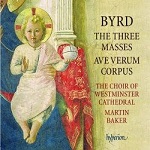 William
BYRD (1539/40–1623) The Three Masses
William
BYRD (1539/40–1623) The Three Masses
Mass for five voices [23:51]
Mass for four voices [23:22]
Mass for three voices [19:32]
Ave verum corpus [4:43]
Westminster Cathedral Choir/Martin Baker
rec. Westminster Cathedral, London, October 2013. DDD
pdf booklet with texts and translations included
HYPERION CDA68038 [71:30] – from hyperion-records.co.uk (m3, 16- and 24-bit lossless)
Please see my full review on the main MWI pages.
Thomas TOMKINS (1572-1656) Sacred Choral Works
Full anthem: When David Heard [5:28]
Verse anthem: Almighty God, which hast knit together [5:09]
Sixth Service (Verse Service): Magnificat [5:40]; Nunc dimittis [2:29]
Full anthem: Almighty God, the fountain of all wisdom [7:14]
Organ solo: A Sad Pavan for these distracted times [3:30]
Verse anthem: My shepherd is the living Lord [3:51]
Verse anthem: Behold, I bring you glad tidings [3:39]
Voluntary in a minor (MB 28) [3:32]
Third Service (Great Service): Jubilate [7:09]
Clarifica me Pater [2:35]
Third Service (Great Service): Te Deum [11:45]
Freddie James (organ)
Choir of St John’s College, Cambridge/Andrew Nethsingha
rec. St John’s Chapel, Cambridge, 13-18 July 2013. DDD
pdf booklet with texts included
CHANDOS CHACONNE CHAN0804 [62:21] – from theclassicalshop.net (mp3, 16- and 24-bit lossless)
 Though
it overlaps with some of the available recordings of Thomas Tomkins’
music – we didn’t real need yet another version of When David heard,
with three outstanding recordings to its credit – this is a valuable
addition to the discography.
Though
it overlaps with some of the available recordings of Thomas Tomkins’
music – we didn’t real need yet another version of When David heard,
with three outstanding recordings to its credit – this is a valuable
addition to the discography.
The best alternatives are:
• Gimell CDGIM024 : The Great Service and other music:
The Tallis Scholars/Peter Phillips – this would be a fine starting point
for anyone starting to explore Tomkins’ music. Though Tomkins is comparatively
‘modern’ for the Scholars, this is as good as it gets from a specialist
group as opposed to a cathedral or collegiate choir. See The Tallis
Scholars at 30 – here.
• Obsidian OBSID-CD702 : These distracted Times: Choir
of Sidney Sussex College, Cambridge; Fretwork and Alamire/David Skinner
• Naxos 8.553794 : Choral and Organ Works: Oxford Camerata/Jeremy
Summerly – a budget-price recording but not bargain-basement performances
or recording.
In addition there’s a fine recording of music by Tomkins and his contemporaries, Tune thy Musicke to thy Harte: Harmonia Mundi HMU807554 and
the whole Third Service, plus some voluntaries and anthems is
offered by New College Choir, Oxford, with Edward Higginbottom on CRD
CRD3467. Those in search of a bargain, in addition to the Naxos,
should consider a Hyperion Helios reissue of Tomkins’ Cathedral Music
sung by the choir of St George’s, Windsor, directed by Christopher Robinson
(CDH55066). The EMI anthology of music by Weelkes, Gibbons and
Tomkins which I mentioned along with the Helios in The Tallis Scholars
at 30 seems to have disappeared even as a download.
 The
Queen’s Goodnight: Tudor to Jacobean Instrumental Music
The
Queen’s Goodnight: Tudor to Jacobean Instrumental Music
John JOHNSON (fl. 1579-1594) A Dump or The Queenes Treble [3:33]
John DOWLAND (1563-1626) A Pavion: Solus cum sola [4:21]
Anonymous Robin is to the Greenwood gone [4:55]
Edward JOHNSON (fl. 1572-1601) A Medley [3:56]
Richard ALLISON (b. 1560-70, d. before 1610) Allison’s Knell
[4:26]
Anonymous Artheres Dump [5:28]
Thomas ROBINSON (fl. 1589-1609) Twenty Waies upon the Bels [2:57]
The Queenes Good Night [1:53]
John DOWLAND The most sacred Queene Elizabeth her Galliard [1:29]
Giles FARNABY (c. 1563-1640) Rest [1:40]
Tobias HUME (c. 1579-1645) Lamentations [6:55]
William BYRD (1540-1623) The Bells [5:51]
Tobias HUME Deth [6:50]; Life [1:19]
Orlando GIBBONS (1583-1625) Fantasia [2:40]
William CORKINE (fl. 1610-17) and Orlando GIBBONS Whoope,
doe me no harme good man [3:27]
John JOHNSON The New Hunt is upp [3:40]
Anonymous The Scottish Huntsupe and Jigg [3:35]
Charivari Agréable (Susanne Heinrich (treble, tenor and bass Viols);
Kah-Ming Ng (keyboards); Lynda Sayce (lute))
rec Hertford College, Oxford, April 2002. DDD
SIGNUM SIGCD020 [68:54] – from classicsonline.com (mp3) or stream from Naxos Music Library or Qobuz
See review and review.
The lack of a booklet from any download source is a problem but the
two reviews listed should help and you can find brief notes on the Signum
webpage – here.
Estienne (Étienne) MOULINIÉ (1599-1676) Meslanges pour
la Chapelle d’un Prince
O bone Jesu. Motet du nom de Jésus. A cinq [1:52]
Lauda Sion salvatorem. Motet du S. Sacrement. A cinq [1:43]
Caro mea vere est cibus. Motet du S. Sacrement. A cinq [2:21]
Antoine BOËSSET (1586-1643) Jesu nostra redemptio. A quatre
et a cinq [3:27]
Cantate Domino. Motet. A cinq [3:05]
O bone Jesu. Motet du nom de Jésus. A cinq (instrumental) [1:50]
Magi videntes stellam. Motet pour le jour des Roys. A cinq [1:49]
O dulce nomen. Motet du nom de Jésus. A cinq [2:56]
Ecce video. Motet à S. Etienne. A cinq [1:50]
François de CHANCY (c.1600-1656) Allemande (solo) [1:55]
Antoine BOËSSET Popule meus quid fecit tibi; Pie Jesu [9:48]
Ne reminiscaris Domine. Motet pour les Pénitens. A cinq [3:39]
François de CHANCY Allemande en ut [2:06]
Ego flos campi [2:30]
Dum esset rex [1:20]
Louis CONSTANTIN (c.1585-1657) La Pacifique [2:37]
Veni sponsa mea. Motet de la Vierge. A cinq [5:40]
O salutaris hostia. Motet du S. Sacrement. A cinq (instrumental)
[1:37]
Litanies de la Vierge mises en musique a cinq parties pour Madame [10:50]
Flores apparuerunt [3:03]
Ensemble Correspondances/Sébastien Daucé (harpsichord and organ)
rec. Temple Lanterne, Lyon, February 2014. DDD.
pdf booklet included.
HARMONIA MUNDI HMC902194 [65:53] – from eclassical.com (mp3, 16- and 24-bit lossless)
 Harmonia
Mundi have prefaced the title page with the name of Estienne Moulinié,
presumably because he is the best known of a fairly obscure group of
early 17th-century French composers. Even so, his is hardly
a household name, with around 15 CDs wholly or partly devoted to him
in the present catalogue and some of those contain only one or two pieces
by him. On some of those his music is coupled, as here, with that of
Antoine Boësset. Clear, bright performances, well recorded, especially
in 24-bit format, makes this an attractive introduction to the music
of the period.
Harmonia
Mundi have prefaced the title page with the name of Estienne Moulinié,
presumably because he is the best known of a fairly obscure group of
early 17th-century French composers. Even so, his is hardly
a household name, with around 15 CDs wholly or partly devoted to him
in the present catalogue and some of those contain only one or two pieces
by him. On some of those his music is coupled, as here, with that of
Antoine Boësset. Clear, bright performances, well recorded, especially
in 24-bit format, makes this an attractive introduction to the music
of the period.
(NB: if you have already purchased this recording and noticed
a dropout on track 4, that has now been corrected. Eclassical.com allow
you to return to 'my account' and download again.)
 For
an album wholly devoted to Estienne Moulinié, there’s L’Humaine
Comédieon Alpha ALPHA005 [68:57] – from eclassical.com (mp3 and lossless, no booklet, no CD equivalent) on which Poème Harmonique
and Vincent Dumestre (lute, theorbo and baroque guitar) perform some
of his secular vocal and instrumental music: the longest pieces are
a series of bird sounds, Concert de differents oyseaux, and Entrées
instrumentales du ballet du Mariage de Pierre de Provence avec la belle
Maguelonne. The album can be streamed, with
For
an album wholly devoted to Estienne Moulinié, there’s L’Humaine
Comédieon Alpha ALPHA005 [68:57] – from eclassical.com (mp3 and lossless, no booklet, no CD equivalent) on which Poème Harmonique
and Vincent Dumestre (lute, theorbo and baroque guitar) perform some
of his secular vocal and instrumental music: the longest pieces are
a series of bird sounds, Concert de differents oyseaux, and Entrées
instrumentales du ballet du Mariage de Pierre de Provence avec la belle
Maguelonne. The album can be streamed, with 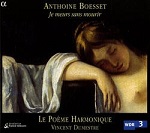 33-page
booklet – multilingual texts and translations – from Qobuz . If Qobuz can offer the booklet, why not eclassical.com or Naxos
Music Library, from whom it can also be streamed?
33-page
booklet – multilingual texts and translations – from Qobuz . If Qobuz can offer the booklet, why not eclassical.com or Naxos
Music Library, from whom it can also be streamed?
Ant(h)oine Boësset also has an Alpha CD to himself, with a few
pieces by that prolific composer, Anon, of vocal and dance music for
the court of Louis XIII: French Airs de Cour – Je meurs sans mourir, again with Poème Harmonique and Vincent Dumestre (ALPHA057 – from eclassical.com, mp3 and lossless, no booklet). Once again, despite
enthusiastic reviews when released in 2004, the CD is deleted and for
these vocal works in a melange of languages the lack of a booklet is
more serious. This time Qobuz,
though it can be streamed from there and Naxos
Music Library, has no booklet.
Georg Philipp TELEMANN (1681-1767) Grand Concertos Volume 1
Concerto for 2 Trumpets and 2 Oboes in D, TWV deest [10:34]
Concerto for 2 Flutes and Oboe in B-flat, TWV54:B1 [12:13]
Concerto for 2 Oboe d’amore and Cello in D, TWV53:D3 [7:44]
Concerto for Flute, Oboe d’amore and Viola d’amore in E, TWV53:E1 [17:20]
Septet in a Minor, TWV44:42 [7:03]
Sinfonia in F, TWV50:3 [7:27]
Almut Rux, Hannes Rux (trumpets), Karl Kaiser, Michael Schneider (flute),
Martin Stadler (oboe), Katrin Ebert, Ingeborg Scheerer (violin), Luise
Baumgartl (oboe d’amore), Juris Teichmanis (cello), Swantje Hoffman
(viola d’amore), Tabea Demus (recorder), Rainer Zipperling (viola da
gamba)
La Stagione Frankfurt/Michael Schneider
pdf booklet included
rec. Deutschlandfunk Kammermusiksaal, Köln, May 2013 (54:B1, 53:D3,
53:E1, 50:3), October 2013 (44:42), January 2014 (TWV deest).
DDD.
 CPO
777 859-2 [62:21] – from eclassical.com (mp3 and lossless) or stream from Naxos
Music Library or Qobuz
CPO
777 859-2 [62:21] – from eclassical.com (mp3 and lossless) or stream from Naxos
Music Library or Qobuz
Type ‘La Stagione Frankfurt CPO’ into the MusicWeb International search
engine and you’ll find that they have already given us several fine
recordings of the music of Telemann and his contemporaries, alone or
in company with Camerata Köln. Now they embark on a promised – and
very promising – series of grand concertos, by which is meant works
with several soloists.
One small grumble: both eclassical.com and Qobuz offer the booklet,
but shorn of the CD insert where venue and recording date are given.
When I complained about getting only the front and back of CPO booklets,
I didn’t intend them to make us do without the back. Naxos Music Library
come to the rescue with the booklet and the rear insert.
Jean-Philippe RAMEAU (1683-1764)
Suite: Les Indes Galantes [43:25]
Prologue – Ouverture [2:55]; Entrée des quatre nations [2:37]; Air pour les esclaves africains [1:32]; Air vif [2:01];Musette
en rondeau [1:20]; Air pour les amants et les amantes [1:08]; Air pour les deux Polonais [1:47]; Menuet I-II [2:35]; Contredanse [1:51]; Ritournelle pour ‘Le Turc généreux’ [0:59]
Les Turcs – Forlane des matelots [1:58]; Tambourin I-II
[1:36]
Les Incas – Ritournelle pour les Incas du Pérou [1:06]; Air
des Incas [2:13]; Air pour l'adoration du soleil [2:23]; Gavotte I-II [2:31]
Les Fleurs – Ritournelle pour la fête persane [1:04]; Marche [2:01]; Air pour Zéphire [1:06]; Air pour Borée et la rose [1:26]
Les Sauvages – Air pour les sauvages [1:40]; Chaconne [5:30]
Orchestra of the Eighteenth Century/Frans Brüggen
rec. Vredenburg, Utrecht, October 1992. DDD
DECCA ORIGINALS 4757780 [43:25] – from 7digital.com (mp3) or stream from Qobuz
 There’s
a great deal more to Les Indes Galantes than the Air des Sauvages which is regularly trotted out on Classic FM – or, indeed than is
included in any orchestral selection. I recently recommended two recordings
of the orchestral music – 2014/4 – but, looking around for a recording to commemorate the late Frans
Brüggen, now think this an even better recommendation. There’s as much
music as on the Herreweghe (Harmonia Mundi), though we are given a slightly
different selection and in a different order – that in which the music
occurs in the complete opera-ballet. Given that the download
There’s
a great deal more to Les Indes Galantes than the Air des Sauvages which is regularly trotted out on Classic FM – or, indeed than is
included in any orchestral selection. I recently recommended two recordings
of the orchestral music – 2014/4 – but, looking around for a recording to commemorate the late Frans
Brüggen, now think this an even better recommendation. There’s as much
music as on the Herreweghe (Harmonia Mundi), though we are given a slightly
different selection and in a different order – that in which the music
occurs in the complete opera-ballet. Given that the download 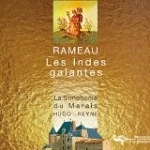 from
7music.com costs just £4.99 and the Qobuz link will take you to an offer
of lossless sound for £6.75, only the lack of a booklet presents a problem.
from
7music.com costs just £4.99 and the Qobuz link will take you to an offer
of lossless sound for £6.75, only the lack of a booklet presents a problem.
If you bought the Concert d’Astrée’s inexpensive 2-CD set Une Fête
Baroque (7307992 – review),
liked the two vocal extracts from Les Indes Galantes on CD1 and
would like more than the orchestral suites, but don’t want the Opus
Arte DVD with William Christie and Les Arts Florissants (OA0923D – review) Qobuz have
a recording directed by Hugo Reyne, who, though I think of him more
as a Lully specialist, directs a stirring and enjoyable performance,
ably assisted by Les Solistes, Chœur et Simphonie du Marais, recorded
in Vienna in January 2013 on their own label (605013). Stream
in lossless sound or download for €17.29 (16-bit) or €25.89 (24-bit),
complete with multi-page booklet.
Robert SCHUMANN (1810-1856) The Symphonies
Symphony No. 1 in B flat, Op.38 ‘Spring’ [32:36]
Symphony No. 2 in C, Op.61 [38:22]
Symphony No. 3 in E flat, Op.97 ‘Rhenish’ [32:51]
Symphony No. 4 in d Minor, Op.120 (1851 version) [29:35]
Scottish Chamber Orchestra/Robin Ticciati
rec. Perth Concert Hall, Perth, Scotland, 1-3 December 2013. DDD/DSD
pdf booklet included
LINN RECORDS CKD450 [133:24] – from linnrecords.com (SACD, mp3, 16- and 24-bit lossless downloads) or hyperion-records.co.uk (mp3 and lossless)
Robert SCHUMANN Complete Symphonic Works: Vol. II
Symphony No. 2 in C, Op.61 [36:10]
Symphony No. 3 in E-flat, Op.97 ‘Rhenish’ [30:35]
WDR Sinfonieorchester Köln/Heinz Holliger
rec. 2012. DDD
AUDITE 97.678 [66:50] – from eclassical.com (mp3 and lossless) or stream from Naxos
Music Library or Qobuz (no booklet from any source)
 Effectively
2 CDs for the price of one, the Linn is about the least expensive
way to obtain the complete Schumann symphonies. Even my benchmark recording
from Wolfgang Sawallisch on Warner/EMI costs rather more on CD (5677682,
with Overture, Scherzo and Finale, around £12 or download from sainsburysenteretainment.co.uk for £8.99) as against £8.00 for the
Linn in mp3 or £10 for the 16-bit download) and even the Studio Master
downloads – from Linn only at present – are competitive at £18.
Effectively
2 CDs for the price of one, the Linn is about the least expensive
way to obtain the complete Schumann symphonies. Even my benchmark recording
from Wolfgang Sawallisch on Warner/EMI costs rather more on CD (5677682,
with Overture, Scherzo and Finale, around £12 or download from sainsburysenteretainment.co.uk for £8.99) as against £8.00 for the
Linn in mp3 or £10 for the 16-bit download) and even the Studio Master
downloads – from Linn only at present – are competitive at £18.
Bargain or no, any recording of these symphonies has to hold its own
against that Sawallisch set or my other favourites from the past: Josef
Krips in Nos. 1 and 4 (budget-price Decca Eloquence 4804325,
2 CDs, with Brahms Symphonies 1 and 4 – download in mp3 from 7digital.com ), Rafael Kubelík, especially in Nos. 2 and 3 (lower-mid-price
DG Originals 4778621, all four symphonies plus Genoveva and Manfred) and George Szell’s Rhenish (budget-price
Sony 5160272, all four symphonies for around £10. Download earlier
release, without Genoveva, from sainsburysentertainment.co.uk for £8.99).
The odd slightly ungainly tempo change in the finale apart, Ticciati gives just as joyous an account of the Spring symphony as Krips
– my first recording of the work, on 10” Decca – or Sawallisch, my current
benchmark. The direct competition here comes from Thomas Dausgaard
in the BIS ‘Opening Doors’ series, also with a chamber-size orchestra,
the Swedish CO (BIS-SACD-1569, with Overture, Scherzo and
Finale and Overtures), which I liked rather better than Philip Borg-Wheeler
– review – though I agreed that his vision of Spring is too fiery – DL
Roundup April 2010.
I liked the rest of that BIS series – details in the same DL Roundup
– and I shall continue to listen to it with enjoyment alongside the
new recording, but the Linn is likely to become one of my benchmarks
in future alongside the other favourites that I’ve mentioned, especially
as the recording is good, even in 16-bit and mp3 format. This version
of the Rhenish doesn’t quite efface memories of Szell, another
old favourite which I owned on a Columbia Epic LP: Ticciati lingers
a little more, but his is in the same league of life-enhancing performances.
If you think Szell too fast, you may prefer Ticciati.
Ditto for Krips’ No.4 – obtained on Decca Ace of Diamonds, with No.1,
when I traded in that 10" LP – but again in the same league. Dausgaard
wins here by dint of offering both versions of this symphony. The finale
on Linn, aided by some hearty thwacks with wooden drum-sticks, brings
the house down.
 There’s
no special price for the Audite recording but, at $12.02 – just
over £7 at current rates – it won’t break the bank and it’s well worth
considering if you’re in the market for just these two symphonies.
Tempi are a shade faster throughout than on Linn, especially in the
third movement of No.2 (8:26 against 10:13) and the opening movement
of the Rhenish (8:58 against 9:37). The former is marked adagio
espressivo and most take that to indicate a timing of a little over
10 minutes – Sawallisch takes 10:18 – but Heinz Holliger makes his faster
tempo seem perfectly natural and unhurried. The opening movement of
the Rhenish, marked lebhaft, certainly benefits from the
faster treatment: Sawallisch is even a shade faster at 8:55, though,
surprisingly, the speed-merchant Szell takes longer at 9:13. It seems
that Szell was not such a speedy Gonzalez in this work as I recall –
in fact, TH’s review in 1963 comments on the comparatively spacious
speed in the second movement: at 6:15 he’s slower than Holliger (5:40)
or Ticciati (6:02). I like the way that Holliger keeps the music moving
here without seeming hurried; listening to Szell again, in lossless
sound via Qobuz,
I now think he’s inclined to make the movement sound a little arthritic
and Sawallisch at 6:42 seems impossibly slow after hearing Holliger.
So much for cherished benchmarks: of those that I mentioned at the outset,
only Kubelík, at an ideal compromise of 6:08, holds up here.
There’s
no special price for the Audite recording but, at $12.02 – just
over £7 at current rates – it won’t break the bank and it’s well worth
considering if you’re in the market for just these two symphonies.
Tempi are a shade faster throughout than on Linn, especially in the
third movement of No.2 (8:26 against 10:13) and the opening movement
of the Rhenish (8:58 against 9:37). The former is marked adagio
espressivo and most take that to indicate a timing of a little over
10 minutes – Sawallisch takes 10:18 – but Heinz Holliger makes his faster
tempo seem perfectly natural and unhurried. The opening movement of
the Rhenish, marked lebhaft, certainly benefits from the
faster treatment: Sawallisch is even a shade faster at 8:55, though,
surprisingly, the speed-merchant Szell takes longer at 9:13. It seems
that Szell was not such a speedy Gonzalez in this work as I recall –
in fact, TH’s review in 1963 comments on the comparatively spacious
speed in the second movement: at 6:15 he’s slower than Holliger (5:40)
or Ticciati (6:02). I like the way that Holliger keeps the music moving
here without seeming hurried; listening to Szell again, in lossless
sound via Qobuz,
I now think he’s inclined to make the movement sound a little arthritic
and Sawallisch at 6:42 seems impossibly slow after hearing Holliger.
So much for cherished benchmarks: of those that I mentioned at the outset,
only Kubelík, at an ideal compromise of 6:08, holds up here.
The Audite recording is good throughout, though I miss those powerful
drum thwacks, so apparent on the Linn recording. If you bought the
first volume (Audite 97.677, Symphony No.1 and No.4, original
version, and Overture, Scherzo and Finale) I’m sure you’ll want
the second. The third volume, containing the Cello Concerto and final
version of the Fourth Symphony, is due for release in October 2014.
I should add that I haven’t yet heard the new, highly-regarded BPO/Simon
Rattle set –
review – except for the 1-minute segments from Qobuz,
but I see that he attributes his appreciation of Schumann to a meeting
long ago with Heinz Holliger, whom he describes as a Schumann ‘nut’
– endorsement of a kind for his mentor’s new recording.
Richard WAGNER (1813-1883)
Das Rheingold
Hans Hotter (Wotan)
Toni Blankenheim (Donner)
Georgine von Milinkovic (Fricka)
Ludwig Suthaus (Loge)
Josef Traxel (Froh)
Elisabeth Grümmer (Freia)
Maria von Ilosvay (Erda)
Paul Kuën (Mime)
Gustav Neidlinger (Alberich)
Arnold van Mill (Fasolt)
Josef Greindl (Fafner)
Dorothea Siebert (Woglinde)
Paula Lenchner (Wellgunde)
Elisabeth Schärtel (Flosshilde)
Bayreuth Festival Orchestra/Hans Knappertsbusch
- rec. live, Bayreuth 1957. ADD/mono
MUSIC AND ARTS OF AMERICA MACD0253 [2:34:53] – from eclassical.com (mp3 and lossless)
 In
recent years Keilberth’s 1950s Bayreuth Ring cycle has been refurbished
and rediscovered. Knappertsbusch, who took over from him in 1956, was
certainly no whizz kid and his performances seem measured by comparison
but they, too, have their merits, not least the strong cast which he
inherited from Keilberth. The live recording could hardly be mistaken
for something more modern; the audience are hyper-bronchitic at the
start and there are a few distracting stage noises, especially heard
on headphones, but overall the transfer is good to very good for its
age. I long ago learned to like Kna’s Wagner: his Parsifal is
one of the slowest accounts of a very long work, but his mono recording
is still my benchmark for that opera. There’s no text but Chandos generously
make available the English translation in the booklet that comes with
their recording (below) to all comers.
In
recent years Keilberth’s 1950s Bayreuth Ring cycle has been refurbished
and rediscovered. Knappertsbusch, who took over from him in 1956, was
certainly no whizz kid and his performances seem measured by comparison
but they, too, have their merits, not least the strong cast which he
inherited from Keilberth. The live recording could hardly be mistaken
for something more modern; the audience are hyper-bronchitic at the
start and there are a few distracting stage noises, especially heard
on headphones, but overall the transfer is good to very good for its
age. I long ago learned to like Kna’s Wagner: his Parsifal is
one of the slowest accounts of a very long work, but his mono recording
is still my benchmark for that opera. There’s no text but Chandos generously
make available the English translation in the booklet that comes with
their recording (below) to all comers.
For a more modern recording by another conductor who took Wagner even
more slowly, but very effectively, Chandos offer Reginald Goodall’s Ring cycle, in Andrew Porter’s very fine English translation,
separately (Rhinegold, CHAN3054,
mp3 or lossless) or as a set on a single USB memory stick, CHUSB0005 – review – now available again in flac or wma lossless for £99.99.
Walhall offer a less expensive 2-CD transcription of this 1957 recording
and of the 1956 and 1958 performances, too, none of which I can vouch
for.
Jacques OFFENBACH (1819-1880) Overtures
La Vie Parisienne [5:03]
Orphée aux Enfers [10:09]
Monsieur et Madame Denis [6:42]
La Belle Hélène [9:40]
La Grande-Duchesse de Gérolstein [4:35]
Barbe-bleue [6:25]
Wiener Staatsoper/Hermann Scherchen
rec. 7 December 1961, Mozart Hall, Vienna
ARCHIPHON ARC-WU178 [42:34] – from eclassical.com (mp3, 16- and 24-bit lossless)
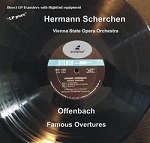 Brian
Wilson was reasonably well disposed towards this collection in his recent review.
Transferred from an original Westminster LP (WST17035) using ‘highend
[sic] equipment’ it ought to be much better than it is. Brian described
the performances as ‘bright and lively’, and so they are; MUCH less
appealing, though, is the shallow, screechy sound. Not only that, there’s
a subsonic rumble in La Vie Parisienne that’s even more disfiguring.
Indeed, I found this a very painful experience all round.
Brian
Wilson was reasonably well disposed towards this collection in his recent review.
Transferred from an original Westminster LP (WST17035) using ‘highend
[sic] equipment’ it ought to be much better than it is. Brian described
the performances as ‘bright and lively’, and so they are; MUCH less
appealing, though, is the shallow, screechy sound. Not only that, there’s
a subsonic rumble in La Vie Parisienne that’s even more disfiguring.
Indeed, I found this a very painful experience all round.
Interestingly I had HDTT’s re-master – from tapes, not LP – and the
sound, while far from ideal, is considerably better than Archiphon’s.
Alas, HDTT’s Bob Witrak appears to have withdrawn this recording from
his catalogue, which is a great pity. At least that version has a degree
of warmth and weight that makes for a more pleasant listening experience.
True, it’s not as analytical as the Archiphon, but that’s a compromise
I’m more than happy to accept here.
Based on this unhappy experience I’m not inclined to try any more Archiphon
titles. They’re not particularly cheap - $11.49 for the 24/96 flacs
reviewed here – and there’s no documentation either. To put it bluntly,
this download is a waste of money, and I’m surprised eclassical have
agreed to host such a substandard product.
Dan Morgan
http://twitter.com/mahlerei
Bedřich SMETANA (1824-1884)
Má Vlast (My country) B110-114, B120-121 (1872-9)
Vyšehrad [15:00]
Vltava [12:37]
Šárka [10:11]
Zèeských luhù a hájù (From Bohemia’s Woods and Fields) [12:09]
Tábor [11:26]
Blaník [13:48]
London Symphony Orchestra/Sir Colin Davis
rec. live, Barbican, London, May 2005. DDD/DSD
pdf booklet included
LSO LIVE LSO0516 [75:11] – from hyperion-records.co.uk (mp3, 16- and 24-bit lossless) or stream from Naxos
Music Library or Qobuz
(also available as hybrid SACD)
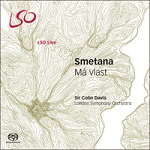 First
let me say that I have recently noted with surprise that some LSO Live
downloads from Hyperion have been significantly more expensive than
the CD equivalents. On this occasion, however, the 16-bit at £6.50
costs less than the disc and the 24/96 only a little more.
First
let me say that I have recently noted with surprise that some LSO Live
downloads from Hyperion have been significantly more expensive than
the CD equivalents. On this occasion, however, the 16-bit at £6.50
costs less than the disc and the 24/96 only a little more.
It’s only since the advent of CD that record companies have been able
to fit the whole of Ma Vlást on one album. It even used to be
possible to buy just one LP with the most popular movements, leaving Tábor and Blaník out in the cold. I even remember taking
just the first LP out of the university record library on the basis
that I just wanted to hear Vltava and From Bohemia’s Woods
and Fields. One of the first CD albums to include the complete
cycle came from Sir Malcolm Sargent on budget-price EMI Laser and it’s
surprisingly good – far better than the usual jack-of-all-trades competent
performances that you might expect – and it remains a very attractive
proposition on Classics for Pleasure (no longer available on CD: download
from 7digital.com for £4.49; stream from Qobuz).
I was going to use the Sargent recording as my benchmark but there’s
a more authoritative one and it comes at an even more attractive price:
the live performance by the Czech Philharmonic and Sir Charles Mackerras,
Czech by adoption and by virtue of the quality of his performances of
their music, comes on a 6-CD set, Life in Czech Music (SU40412 with Dvorák Slavonic Dances, Symphonies 6, 8 and 9,Symphonic
Variations, Legends, Scherzo Capriccioso, In Nature’s Realm, The Water
Goblin, The Noon Witch, The Golden Spinning Wheel and The Wild
Dove). Unfortunately, the 7digital.com link which I gave in 2013/10 when I waxed lyrical about this set is no longer applicable.
I can’t recommend the Amazon download when it costs a good deal more
than the CD set, so iTunes at £24.99 is the least expensive that I can
find – and that’s only pence cheaper than many charge for the CDs.
The opening Vyšehrad is a bit slow to catch fire and Davis’s
tempi throughout are a shade on the slow side, but so are those of Mackerras
and Sargent by comparison with other classic interpretations, such as
those of Rafael Kubelík (Prague Spring 1990) and Vaclav Talich (1954),
the latter in a very acceptable transfer from Naxos (8.111237 – UK readers can download from classicsonline.com and stream from Naxos Music Library* or Qobuz)
and also from BNF, available from Qobuz.
I enjoyed Davis’s performances more as the cycle progressed but his Vltava is not quite as life-enhancing as Talich’s – and it’s
not just the 43-second difference in timings that accounts for it.
I seem to remember reading somewhere that a conductor has to believe
in Má Vlast and Talich certainly did: there’s a live recording
which I haven’t been able to hear of him conducting it in 1939 soon
after the Nazi invasion and by the time of the 1954 recording his country
was again effectively under occupation.
Despite the advantages of 24/96 sound, the Barbican acoustic conspires
to make this sound no better than the mp3 Mackerras. If you are looking
for 24-bit sound at its best, head for the recording by Claus Peter
Flor with the Malaysian Philharmonic (BIS-SACD-1805 – review and Download of the Month, July
2011/2). I don’t want to make too much of the shortcomings of the
LSO Live sound – like the performances, it gets better as the work progresses
and both conspire to make these recordings of the two afterthoughts, Tábor and Blaník, such that I wonder why I ever thought
this a two-movement work.
* I can’t give you a link: my access to NML comes via Naxos USA, where
it’s not available.
Antonín DVOŘÁK (1841-1904)
Symphony No.6, Op.60 (B112) (1880) [46:30]
American Suite, Op.98b (B190) (1894/5) [21:16]
Luzerner Sinfonieorchester/James Gaffigan
rec. KKL Luzern, October 2013. DDD
pdf booklet included
HARMONIA MUNDI HMC902188 [67:46] – from eclassical.com (mp3, 16- and 24-bit lossless)
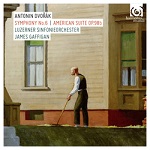 This
has been my first encounter with James Gaffigan and it’s been an auspicious
one. Instead of one of my tried and tested recommendations, I compared
this new recording of the Sixth Symphony with the new Decca set of all
the symphonies and concertos conducted by Jiří Bělohlávek.
I’m more than a little disappointed with Universal for letting us –
myself included – buy his recording of the Cello Concerto separately,
then expecting us to buy it again in the set a month later.
This
has been my first encounter with James Gaffigan and it’s been an auspicious
one. Instead of one of my tried and tested recommendations, I compared
this new recording of the Sixth Symphony with the new Decca set of all
the symphonies and concertos conducted by Jiří Bělohlávek.
I’m more than a little disappointed with Universal for letting us –
myself included – buy his recording of the Cello Concerto separately,
then expecting us to buy it again in the set a month later.
Performances of this very Brahmsian symphony stand or fall by the first
movement. Gaffigan takes all the repeats, thereby giving the movement
due weight. He also takes it comparatively straight and keeps the momentum
going whereas Bělohlávek lingers by the wayside at times.
Unsurprisingly, Bělohlávek takes almost exactly the same
time over this movement as on his earlier Chandos recording (CHAN9170,
with The Wood Dove) and his general approach remains much the
same, the general effect of which is to make the movement sound longer than with Gaffigan’s fairly constant tempo. There’s plenty of
scenery to admire but I think it best to keep the music moving here,
so I prefer Gaffigan to either Belohlávek performance and to Yakov Kreizberg
(Pentatone, with Vodník – review)
who really does make the first movement sound too long with rubato and the observation of repeats.
The usual comparison is with Brahms’ Second Symphony, a clear influence
here, and the analogy could be drawn with Klemperer’s Brahms – foursquare
but not unyielding, which tends to be my benchmark, contrasting with
Sir Thomas Beecham’s lighter recording of the Second, which I also like
very much. I’m not sitting on the fence – I like both but prefer Gaffigan
– but I can understand that others will see things differently, so I
suggest comparing Gaffigan and one or other of the Bělohlávek
versions if you can – Naxos Music Library have the Chandos, Qobuz can
offer both.
The inclusion of the little-performed American Suite – cue excuse
for an Edward Hopper painting on the cover – would have been a valuable
bonus until quite recently and even now there are not too many recordings:
the doyen comes from Antal Doráti on a Decca twofer (4602932,
with Slavonic Dances and Czech Suite), the most recent
in Dvořák and America on Naxos, coupling the original piano
version of the Suite with the Hiawatha melodrama, arranged from
his music, and music by Arthur Farwell (8.55977). Dmitry Yablonsky’s
recording is available on a single CD (8.557352) or with Stephen
Gunzenhauser’s complete symphonies, etc. (8.501702 – download
only or stream from Qobuz).
The Harmonia Mundi recording is good, but a little light-weight, even
in 24-bit format.
Hitherto my preference for the Suite has been a Supraphon recording
with Josef Suk’s delightful Serenade for Strings and Fantastic
Scherzo (SU3882-2: Prague PO/Hrůša – October
2010 DL Roundup) and that remains very worthwhile if the coupling
appeals.
Charles Villiers STANFORD (1852-1924) Organ Music Volume 2
Marcia Eroica, Op. 189/2 [5:30]
The Angelus, Op. 194/3* [6:44]
Te Deum Laudamus Fantasia, Op. 116/1 [8:14]
Fantasia (In Festo Omnium Sanctorum), Op. 121/1 [7:17]
Idyll, Op. 121/2 [7:31]
Prelude in form of a Minuet, Op. 88/1 [5:10]
Prelude in form of a Toccata, Op. 88/3 [3:30]
Prelude in form of a Pastorale, Op. 88/5 [6:12]
Prelude on the ancient melody Jesu dulcis memoriæ* [4:09]
Organ Sonata No.1 in F, Op.149 [13:43]
Simon Niemiński (1913 Brindley and Foster organ)
rec. Freemasons’ Hall, Edinburgh, 8-9 October 2012. DDD
pdf booklet with organ specification included
* world premiere recording.
RESONUS RES10130 [68:05] – from resonusclassics.com (mp3, aac, 16- and 24-bit lossless) or stream from Qobuz

We have had to wait a while since Volume 1 appeared – June
2011/1: only the fourth release from this enterprising label – and
we’ve had a change of organist and instrument, but the wait has been
worthwhile.
Volume 1 brought us recordings some of the better-known works, but I
still award full marks for the music, especially as there are two first
recordings here. These are sensitive performances, a fine organ – a
lovely growly 1913 instrument, restored in 2009 and just right for the
music – and good recording quality. Last but not least, the booklet
and notes are also almost on a par with Hyperion productions, than which
there are none better. If I wanted to be fussy, I might have liked
to have the registration for each work as well as the organ specification.
Sir Edward ELGAR (1857-1934) Music for Powick Asylum and
other Music
Menuetto [4:22]
Andante and Allegro for oboe and string trio [6:03]
Die Junge Kokette Quadrilles [6:43]
Maud Polka [4:47]
L’Assomoir Quadrilles [6:09]
Nelly Polka [3:11]
La Brunette Quadrilles [7:15]
La Blonde Polka [4:46]
The Valentine Lancers [8:33]
Duett for trombone and double bass [1:19]
Paris Quadrilles [6:21]
Helcia Polka [3:12]
A Singing Quadrille [8:42]
Fugue in d minor for oboe and violin [1:09]
Blumine Polka [4:17]
Innovation Chamber Ensemble/Barry Collett
rec. CBSO Centre, Birmingham, 30-31 July 2013. DDD
pdf booklet available
SOMM SOMMCD252 [76:59] – from theclassicalshop.net (mp3 and lossless) oreclassical.com (mp3 and lossless) or stream fromQobuz or Naxos
Music Library
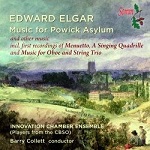 ‘[I]t
provides an interesting window on the activities of the young Elgar,
on British dance music in the later nineteenth century and perhaps on
the enlightened attitude towards “pauper lunatics” in Worcester at that
time.’ See review by John Sheppard.
‘[I]t
provides an interesting window on the activities of the young Elgar,
on British dance music in the later nineteenth century and perhaps on
the enlightened attitude towards “pauper lunatics” in Worcester at that
time.’ See review by John Sheppard.
Don’t be put off by the asylum connotations of the title: this is all
thoroughly enjoyable, if hardly profound or distinctively Elgarian,
music, much of it composed by the youthful composer as bandmaster of
the institution for the dances which the doctors – enlightened for their
time – found so therapeutic for their patients. The small-scale performances
are more like the Viennese dances performed by Willi Boskovsky with
his own Boskovsky Ensemble (Alto ALC1227 – review – and ALC1237: Recording of the Month – review)
rather than the grand affairs on which he and his successors directed
the VPO on New Year’s Day. At current £/$ exchange rates, theclassicalshop.net
download is marginally less expensive for mp3, eclassical.com for lossless.
Rob Barnett liked an earlier recording of 54 minutes of this music,
also directed by Barry Collett – review – but this is a fuller and more expertly performed selection.
Bargains of the Month
Sir Edward ELGAR (1857-1934)
The Apostles, Op.49. [126:53]
Alfreda Hodgson (contralto) - Mary Magdalene
Alison Hargan (soprano) - The Blessed Virgin, The Angel Gabriel
David Rendall (tenor) - St John
Bryn Terfel (bass) - St Peter
Stephen Roberts (bass) - Jesus
Robert Lloyd (bass) - Judas
London Symphony Chorus
London Symphony Orchestra/Richard Hickox
rec. St Jude on the Hill, Hampstead, London, 26-29 March 1990. DDD.
pdf booklet with text available.
CHANDOS CHAN241-49 [equivalent of 2 CDs for the price of one:
73:49 + 53:04] – from theclassicalshop.net (mp3 and lossless). Download available ahead of CD release.
The Kingdom, Op.51 (1906) [94:17]
Clare Rutter (soprano); Susan Bickley (mezzo); John Hudson (tenor);
Iain Paterson (baritone); Hallé Choir and Orchestra/Sir Mark Elder
rec. live, 17 October 2009, Bridgewater Hall, Manchester
no booklet included
HALLÉ CDHLD7526 [57:49 + 36:28] – from emusic.com (mp3, bit-rate c.230kb/s) or stream from Naxos Music Library (with booklet
including English text)
[Recording of the Month – see review by John Quinn and review by Jonathan Woolf]

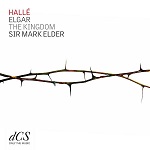
 I
hadn’t tried out either of these recordings before, despite the strong
recommendations which both received at the time of their release, because
the 6-CD EMI set of Elgar’s choral works with Sir Adrian Boult in command
– Music Makers, Gerontius, Apostles, Kingdom and Coronation Ode – is such an outstanding bargain at around
£20 (3679312) that it’s my port of call, though the Gerontius in that set doesn’t get much of an outing from me. The work, not the
performance, is the problem, so I’ll just alert you to the appearance
of a new recording from Sir Andrew Davis on Chandos (CHSA/CHAN5140,
with Sea Pictures – from theclassicalshop.net,
mp3, 16- and 24-bit lossless, due for release on SACD in October 2014
but available to download in advance).
I
hadn’t tried out either of these recordings before, despite the strong
recommendations which both received at the time of their release, because
the 6-CD EMI set of Elgar’s choral works with Sir Adrian Boult in command
– Music Makers, Gerontius, Apostles, Kingdom and Coronation Ode – is such an outstanding bargain at around
£20 (3679312) that it’s my port of call, though the Gerontius in that set doesn’t get much of an outing from me. The work, not the
performance, is the problem, so I’ll just alert you to the appearance
of a new recording from Sir Andrew Davis on Chandos (CHSA/CHAN5140,
with Sea Pictures – from theclassicalshop.net,
mp3, 16- and 24-bit lossless, due for release on SACD in October 2014
but available to download in advance).
Ignoring Beecham’s notorious dismissal of Elgar’s oratorios – specifically Gerontius – along with Wagner’s Parsifal as ‘holy water
in a German beer barrel’, the 2014 Proms opened with a performance of The Kingdom. If you were there or heard it on the radio and
are looking for a performance of that work, look no further than the
Hallé recording; it’s something of a bargain, too, from emusic.com at
£6.72, and though the bit-rate is not ideal at around 225kb/s, that’s
not far short of what you can expect from Amazon and iTunes for almost
twice the price and the sound is reasonable. There’s no booklet but
subscribers to Naxos Music Library will find one there.
By coincidence or design to coincide with Elgar at the Proms, Chandos
have reissued their Hickox recording of The Apostles, which many
prefer even to the Boult set, as a 2-for-1 offer: £7.99 or £9.99 for
mp3 or lossless respectively. That suggests that the Hickox recording
of The Kingdom ( CHAN8788) may also be due for reissue,
so you may prefer to wait and see.
William WALLACE (1860–1940) Symphonic Poems
Sir William Wallace: ‘Symphonic Poem No 5’ [20:45]
William Wallace—Scottish hero, freedom-fighter; beheaded and dismembered
by the English
Villon ‘Symphonic Poem No 6’ [17:40]
François Villon—Rebel poet, tortured; escaped the gallows by inches;
early death a mystery
The Passing of Beatrice ‘Symphonic Poem No 1’ [15:46]
Beatrice—Heroine of purity, pulsing in the rose of Dante’s heaven
Sister Helen ‘Symphonic Poem No 3’ [18:40]
Sister Helen—Villainess, murdering by sorcery; insane with jealous and
frustrated love
BBC Scottish Symphony Orchestra/Martyn Brabbins
rec. City Halls, Candleriggs, Glasgow, December 1995. DDD
pdf booklet included
HYPERION HELIOS CDH55461 [72:51] – from hyperion-records.co.uk (mp3 and lossless) (from CDA66848 – reviews.)
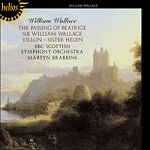 Powerful
music from a polymath: classical scholar, eye surgeon, poet, dramatist,
musicologist and composer – how could it have been so long neglected?
It’s often reminiscent of Hamish MacCunn’s Land of the Mountain and
Flood – he, too, could do with being rediscovered as more than a
one-work composer, and Hyperion ride to the rescue again with a selection
on CDA66815.
Scottish independence or no, both composers deserve to be more widely
known.
Powerful
music from a polymath: classical scholar, eye surgeon, poet, dramatist,
musicologist and composer – how could it have been so long neglected?
It’s often reminiscent of Hamish MacCunn’s Land of the Mountain and
Flood – he, too, could do with being rediscovered as more than a
one-work composer, and Hyperion ride to the rescue again with a selection
on CDA66815.
Scottish independence or no, both composers deserve to be more widely
known.
Wallace’s sub-titles alone are evocative, the music even more so, and
it’s doubtful that it could have better advocates than the BBC Scottish,
Martyn Brabbins, and the Hyperion engineers. You’ll find an analysis
of the music on this album and the Creation Symphony – see below
– by John Purser – here.
If you needed any encouragement, this recording is part of Hyperion’s
‘Composers of the First World War’ offer: £4.00 in mp3 or lossless,
£4.40 on CD till the end of 2014.
 You’ll
have to pay just a little more (£4.99/£5.50 respectively) for the new
reissue of Wallace’s music but it’s still a notable bargain and that’s
your logical next step:
You’ll
have to pay just a little more (£4.99/£5.50 respectively) for the new
reissue of Wallace’s music but it’s still a notable bargain and that’s
your logical next step:
William WALLACE (1860–1940)
Prelude to The Eumenides [10:40]
Pelléas and Mélisande Suite: three movements [15:46]
Creation Symphony in c sharp minor [47:04]
BBC Scottish Symphony Orchestra/Martyn Brabbins
rec. Henry Wood Hall, Glasgow, June 1997. DDD
pdf booklet included
HYPERION HELIOS CDH55465 [73:30] – from hyperion-records.co.uk (mp3 and lossless)
Ferruccio BUSONI (1866-1924) Late Piano Music
Marc-André Hamelin (piano)
rec. various dates/locations
pdf booklet enclosed
HYPERION CDA67951/3 [195:54] –from hyperion-records.co.uk (mp3, 16- and 24-bit lossless)
 I’m
a fully paid up member of the Hamelin fan club, so even though Busoni
isn’t my normal fare I wasted no time downloading this three-and-a-quarter-hour
album. This is daunting repertoire for pianist and listener alike, but
there can be few pianists better qualified to make this epic journey
than Hamelin. Indeed, his recent coupling of Janácek and Schumann shows
him at the peak of his powers (review).
Not only that; Hyperion have an enviable reputation when it comes to
solo piano recordings, so this ought to be a marriage made in heaven.
I’m
a fully paid up member of the Hamelin fan club, so even though Busoni
isn’t my normal fare I wasted no time downloading this three-and-a-quarter-hour
album. This is daunting repertoire for pianist and listener alike, but
there can be few pianists better qualified to make this epic journey
than Hamelin. Indeed, his recent coupling of Janácek and Schumann shows
him at the peak of his powers (review).
Not only that; Hyperion have an enviable reputation when it comes to
solo piano recordings, so this ought to be a marriage made in heaven.
Alas, such unions are seldom without their difficulties. The company’s
website notes that these performances span a number of locations and
dates, so it’s not surprising that the sound varies quite considerably.
On the whole it’s pleasing enough, although balances tend to be quite
close. That is fine in quieter passages, but louder ones are somewhat
aggressive. The bass isn’t always as firm or as well-focused as I’d
like – Busoni’s dense textures don’t help – and the thrilling sense
of presence that I associate with recordings from this stable is generally
hard to find.
Musically things aren’t an unqualified success either. There’s no doubt
Hamelin has the measure of these sometimes impenetrable scores, and
he ekes as much variety and colour from them as he possibly can. However,
I suspect this mammoth traversal is more likely to appeal to Busoni
buffs than to the average listener; certainly I wouldn’t recommend trying
to get through it all in one sitting, for it’s apt to be indigestible
in anything less than selective chunks. So a qualified welcome for this
one, both musically and sonically. I reviewed the 24/96 flacs; Hyperion
also offer 24/96 alacs, but for once I’d be content with the low-res
mp3s.
Dan Morgan
http://twitter.com/mahlerei
Bargain of the Month
Richard STRAUSS (1864-1949) Complete Operas
• Arabella (Keilberth, live, 1963)
• Ariadne auf Naxos (Sinopoli, 2000)
• Capriccio (Böhm, 1971)
• Daphne (Böhm, live, 1964)
• Elektra (Solti, 1967)
 • Feuersnot (Leinsdorf, live, date?)
• Feuersnot (Leinsdorf, live, date?)
• Die Frau ohne Schatten (Solti, 1989-91)
• Die schweigsame Frau (Böhm, live, 1959)
• Friedenstag (Sinopoli, 1999)
• Guntram (Queler - licensed from Sony)
• Die Ägyptische Helena (Doráti, 1979)
• Intermezzo (Sawallisch, 1980 - licensed from EMI)
• Die Liebe der Danaë (Krauss, 1952)
• Der Rosenkavalier (Solti, 1968)
• Salome (Sinopoli, 1990)
• Vier letzte Lieder (Norman/Masur, 1982)
DEUTSCHE GRAMMOPHON 4792274 [33 CDs: 33:31:16] or as a download
in two volumes, 4792277 (Arabella – Die schweigsame
Frau) [17:32:53] and 4792278  (Friedenstag
– Vier letzte Lieder) [15:58:23].
(Friedenstag
– Vier letzte Lieder) [15:58:23].
Please see my article: Richard Strauss - Some recent opera releases and reissues for
this tremendous bargain and some other recent Strauss offerings.
Discovery of the Month
Ralph VAUGHAN WILLIAMS (1872-1958)
Dona Nobis Pacem (1936) [33:39]
Symphony No.4 in f minor (1934) [34:12]
The Lark Ascending (1914) [14:56]
David Coucheron (violin); Jessica Rivera (soprano), Brett Polegato (baritone)
Atlanta Orchestra Chorus and Symphony Orchestra/Robert Spano
rec. Woodruff Performing Arts Center, Atlanta Symphony Hall, Atlanta,
Georgia, 21-22 February, 2014. DDD/DSD
Pdf booklet with texts included
ASO MEDIA ASO1005 [33:39 + 49:08] – from classicsonline.com (mp3 or lossless) or stream from Naxos
Music Library
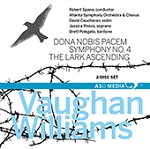
 The
discovery is not the music but the quality of the performances from
an orchestra which I hadn’t expected to deliver the goods. I checked
out this recording of VW’s war-related works from Naxos Music Library
initially out of curiosity: could an American orchestra do justice to
such quintessentially English music? I’m pleased to report that Dona
nobis pacem confounded my narrow pre-conceptions: this is as fine
a performance as I have ever heard of this powerful work, on a par with
recordings by David Hill (Naxos 8.572424), Richard Hickox (Warner/EMI 7547882), both
with Sancta Civitas, or Bryden Thomson (Chandos,
with Five Mystical Songs).
The
discovery is not the music but the quality of the performances from
an orchestra which I hadn’t expected to deliver the goods. I checked
out this recording of VW’s war-related works from Naxos Music Library
initially out of curiosity: could an American orchestra do justice to
such quintessentially English music? I’m pleased to report that Dona
nobis pacem confounded my narrow pre-conceptions: this is as fine
a performance as I have ever heard of this powerful work, on a par with
recordings by David Hill (Naxos 8.572424), Richard Hickox (Warner/EMI 7547882), both
with Sancta Civitas, or Bryden Thomson (Chandos,
with Five Mystical Songs).
Bernard Haitink’s series of recordings of the VW symphonies had already
made it obvious that non-English conductors could make sense of his
music and that set remains my go-to collection (recently reissued on
Warner 9847592 – review)
alongside Sir Adrian Boult’s Decca mono recordings from the 1950s, but both he and André Previn (RCA:
download only – sainsburysentertainment.co.uk ) were working with English orchestras,
the LPO and LSO respectively. This recording from Atlanta now joins
those, together with Vernon Handley (Classics
for Pleasure 5757602, complete symphonies, etc.), as my favourite
recordings of the Fourth Symphony. Not that any of these make it easy
to love – written in 1936 when the storm clouds were again gathering
over Europe, it seems both to reflect the mood of the time and to hark
back to VW’s wartime experiences. Though the composer denied these
connections, as he did for the Sixth Symphony, they certainly can’t
be shaken from my mind when listening to the music.
If Dona nobis pacem and the symphony look both back to WWI and
forward to WWII, the wartime connection of the lyrical The Lark Ascending is less obvious until you bear in mind that it was composed in 1914
but not published until after the war. Its inclusion here will please
Classic FM fans who keep voting it No.1 – why not the Tallis Fantasia,
a much more beautiful work? – but it otherwise seems out of place as
the coda to two powerful works.
My only reservation concerns the fact that this is short value as a
2-CD set – £15.98 in mp3 – when it’s only slightly too long to fit on
one disc. If The Lark Ascending had been omitted – and we’ve
only recently had a very fine Chandos recording from Tasmin Little and Andrew Davis – they would have done
so.
As I closed this DL News eclassical.com added it in mp3 and lossless for a lower price, but without booklet:
$14.90.
Ernest BLOCH (1880–1959)
Israel Symphony (1912–1916)* [30:47]
Suite for Viola and Orchestra (1917–1919)** [35:54]
*Adriana Kohutková, Katarína Kramolišová (soprano); Terezia Bajaková
(mezzo); Denisa Hamarová (contralto); Michal Macuha (baritone)
Slovak Radio Symphony Orchestra
** Yuri Gandelsman (viola); Atlas Camerata Orchestra/Dalia Atlas
rec. Concert Studio of Slovak Radio, Bratislava, Slovakia, 18–22 October
2000 (Symphony) and the Churchill Auditorium, Haifa, Israel, 10–11 May
2001 (Suite). DDD
pdf booklet included
NAXOS 8.573283 [66:48] – from classicsonline.com (mp3 and lossless) or stream from Naxos Music Library
 Like
Bloch’s Symphony in E-flat and Three Jewish Poems which
I reviewed in 2014/10, this is a reissue of a recording first released
on ASV. The Israel Symphony has no current rival on CD and only
one as a download, conducted by Evgeny Svetlanov on Brilliant Classics.
Released in 2004 to general approval, the reissue of such rarely performed
music in at budget price is very welcome; these performances should
help to ‘sell’ it to a wider audience.
Like
Bloch’s Symphony in E-flat and Three Jewish Poems which
I reviewed in 2014/10, this is a reissue of a recording first released
on ASV. The Israel Symphony has no current rival on CD and only
one as a download, conducted by Evgeny Svetlanov on Brilliant Classics.
Released in 2004 to general approval, the reissue of such rarely performed
music in at budget price is very welcome; these performances should
help to ‘sell’ it to a wider audience.
The lossless download sounds fine – but please note that like all lossless
downloads from classicsonline.com it comes as one long file. There
are patent track splitters but it’s something of a hassle to use them.
Zoltán KODÁLY (1882-1967)
Háry János Suite, Op.15 [22:23]
Háry János (excerpts) [19:20]
Ballet Music [6:23]
Dances of Marosszék [12:54]
Dances of Galánta [15:35]
Magda Tiszay, Imre Pallo, Oszkar Maleczky,
Hungarian State Opera Chorus
Budapest Philharmonic Orchestra/János Ferencsik
rec. Mátyás Church, Budapest, 1964.
HUNGAROTON HCD32122 [76:35] - from eclassical.com (mp3 and lossless)
Háry János Suite, Op.15* [22:23]
Concerto for Orchestra (1939)** [19:59]
Budapest Philharmonic Orchestra*; Hungarian State Orchestra**/János
Ferencsik
rec. 1980? Released 1985. ADD?
HUNGAROTON HCD12190 [42:10] – from eclassical.com (mp3 and lossless)
Missa Brevis [34:38]
Concerto for Orchestra [22:13]
Maria Gyurkovics, Edit Gancs, Timoa Cser (sopranos), Magda Tiszay (contralto),
Endre Rösler (tenor), György Littassy (bass); Budapest Choir;
Hungarian State Orchestra/Zoltán Kodály – rec. 1956. ADD/mono
Budapest Philharmonic Orchestra/Zoltán Kodály – rec. 1962. ADD/stereo
BEULAH 1PD21 [76:51] – from iTunes (mp3) or stream from Qobuz.
Psalmus Hungaricus, Op.13 [23:09]
Variations on a Hungarian Folksong, Felszallott a pava (The Peacock)
[24:41]
József Simándy (tenor); Hungarian Radio Children’s Choir; Budapest Chorus
Hungarian State Orchestra/Antal Doráti
No texts.
HUNGAROTON HCD11392 [47:50] – from eclassical.com (mp3 and lossless)
Psalmus Hungaricus, Op.13 [20:16]
Dances of Marosszék [12:31]
Dances of Galánta [15:34]
András Molnar
(tenor); Györ Bartók Béla Children’s Chorus; Hungarian
State Chorus
Budapest Festival Orchestra/Iván Fischer
No texts
HUNGAROTON HCD31324 [48:21] – from eclassical.com (mp3 and lossless) or stream from Naxos
Music Library
Comparative recordings:
• Háry János, Dances of Galánta and Marosszék: Philips
4628242 Budapest FO/Iván Fischer – download only: or Nimbus NI7081 Háry János,Galánta and Peacock Variations: Hungarian
SSO/Adam Fischer – for both see October
2009 DL Roundup. (NB: passionato.com link no longer valid: go to prestoclassical.co.uk (mp3 and lossless).
• Háry János, Dances of Galánta, Peacock Variations, Concerto
for Orchestra, Symphony in C : Double Decca 4430062: Philharmonia
Hungarica/Antal Doráti. Also included in 4-CD set 4782303: Bargain
of the Month – review.
• Psalmus Hungaricus with Janácek Glagolitic Mass: Chandos CHAN9310 Sir Charles Mackerras – December
2011/1 DL Roundup
• Psalmus Hungaricus (in English) with Bartók Dance Suite: Everest SDBR3022 LPO/Ferencsik – review and 2013/16
DL News.
I’m sorry to present you with such an array of authoritative recordings
of the music of Kodály, all with Hungarians at the helm. If you are
looking for a bargain introduction to his major works, you can’t do
better than the Doráti collection, either on the Double Decca or with
other equally fine recordings directed by István Kertész on the 4-CD
set. Otherwise my benchmarks come from Iván Fischer on a Philips recording
which, incredibly, remains available only as a download; surely it will
reappear with his other recordings from Channel Classics.
 Apart
from the Everest recording, the oldest here is the 1964 recording from
János Ferencsik, still sounding well in the lossless transfer on HCD32122.
In addition to the usual suite from Háry János we have several
vocal items from the original Singspiel – as, indeed, we also
have on the Philips recording. These are a welcome addition to the
original LP with the Suite and the Dances and the only problem concerns
the lack of texts with this or any of the Hungaroton downloads. You
could purchase the CD but of the albums listed only this and HCD11392 remain available on disc in the UK.
Apart
from the Everest recording, the oldest here is the 1964 recording from
János Ferencsik, still sounding well in the lossless transfer on HCD32122.
In addition to the usual suite from Háry János we have several
vocal items from the original Singspiel – as, indeed, we also
have on the Philips recording. These are a welcome addition to the
original LP with the Suite and the Dances and the only problem concerns
the lack of texts with this or any of the Hungaroton downloads. You
could purchase the CD but of the albums listed only this and HCD11392 remain available on disc in the UK.
 I
can be sure of the date of the recording but not of the other Ferencsik
recording on HCD12190. Though the orchestra remains the same
for the Háry János Suite, this appears to have been made at a
different (later?) date since the timings of the movements all differ
slightly, in some cases up, in others down. The Concerto for Orchestra appears to date from around 1980 – certainly not much later, since Ferencsik
died in 1984. The Suite is just as fine as on the other recording and
the Concerto receives what was then a fairly rare outing. The
latter is not as well balanced but doesn’t deserve the slating which
it received from LS in 1985 – perhaps he was writing about the LP rather
than the CD, both of which appeared simultaneously. Certainly the lossless
transfer is not bad at all, though Doráti on Decca is clearer, even
in mp3.
I
can be sure of the date of the recording but not of the other Ferencsik
recording on HCD12190. Though the orchestra remains the same
for the Háry János Suite, this appears to have been made at a
different (later?) date since the timings of the movements all differ
slightly, in some cases up, in others down. The Concerto for Orchestra appears to date from around 1980 – certainly not much later, since Ferencsik
died in 1984. The Suite is just as fine as on the other recording and
the Concerto receives what was then a fairly rare outing. The
latter is not as well balanced but doesn’t deserve the slating which
it received from LS in 1985 – perhaps he was writing about the LP rather
than the CD, both of which appeared simultaneously. Certainly the lossless
transfer is not bad at all, though Doráti on Decca is clearer, even
in mp3.
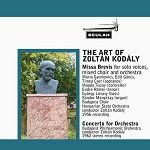 The
short playing time on this and several of these other Hungaroton recordings
is taken care of by eclassical.com’s per-second charging policy: $7.59
for this album.
The
short playing time on this and several of these other Hungaroton recordings
is taken care of by eclassical.com’s per-second charging policy: $7.59
for this album.
1PD21 : I somehow seem to have missed Kodály’s own 1962 recording
of the Concerto when Beulah released it in February 2014 but
I caught up with it via Qobuz. The performance is presumably authoritative
and the recording, made by DG, though a touch dry, is more than good
enough to allow us to appreciate it, though I think it’s a little earlier
than the stated 1962, since it was reviewed in the January of that year.
The coupling, recorded by HMV and also conducted by the composer, gives
us a benchmark by which to judge more recent performances of the Missa
Brevis.
Both the remaining Hungaroton recordings contain stylish versions of Psalmus Hungaricus. If you already have the Dances, the Doráti
recording will be preferable, especially as it comes with a good performance
of the Peacock Variations.
Herbert HOWELLS (1892-1983)
Stabat Mater (1959-65)* [48:42]
Te Deum (1944/77)* [9:05]
Sine nomine (1922)† [12:37]
Benjamin Hulett (tenor)*; Alison Hill (soprano)†
The Bach Choir
Bournemouth Symphony Orchestra/David Hill
rec. The Lighthouse, Poole, Dorset, UK, 30 November and 1 December,
2013. DDD
pdf booklet with texts included
NAXOS 8.573176 [70:24] – from classicsonline.com (mp3)
 Naxos
have been doing lovers of 20th-century English music proud
with new releases and reissues licensed from BMS and others. There’s
only one other recording of the Stabat Mater and, good as that
is, it’s nice to have a choice. That rival recording comes on a Chandos
2-for-1 reissue, withMissa Sabrinensis, the LSO conducted by
Gennady Rozhdestvensky (CHAN211-27 – review and DL
Roundup June 2011/2, where it’s reviewed with several other Howells
recordings). Rozhdestvensky proves a surprisingly apt conductor of
music with which I would never have associated him, but David Hill is
steeped in English church music, both Anglican and Roman Catholic, and
you may prefer his rather tauter performance, well supported by fine
soloists and the hugely experienced Bach Choir.
Naxos
have been doing lovers of 20th-century English music proud
with new releases and reissues licensed from BMS and others. There’s
only one other recording of the Stabat Mater and, good as that
is, it’s nice to have a choice. That rival recording comes on a Chandos
2-for-1 reissue, withMissa Sabrinensis, the LSO conducted by
Gennady Rozhdestvensky (CHAN211-27 – review and DL
Roundup June 2011/2, where it’s reviewed with several other Howells
recordings). Rozhdestvensky proves a surprisingly apt conductor of
music with which I would never have associated him, but David Hill is
steeped in English church music, both Anglican and Roman Catholic, and
you may prefer his rather tauter performance, well supported by fine
soloists and the hugely experienced Bach Choir.
It’s not that simple, however, because the coupling on the Chandos recording
is the only recording of the equally fine Missa Sabrinensis.
At £11 on CD or £8.40/£9.99 for mp3/lossless download from theclassicalshop.net it’s as inexpensive, disc for disc, as the Naxos. The latter comes
in mp3 only – why do they offer only a few releases in flac? – but it
can be streamed in lossless sound from Qobuz and purchased from there – again in lossless sound – for about the same
price as the classicsonline.com mp3. Whichever recording you choose,
Howells’ music deserves to be more widely heard and known.
The Te Deum represented a fresh approach to Anglican music and
it receives a performance to match. Even in the mp3 version the recording
is good throughout.
Peter WARLOCK (1894-1930) Choral Music
The full heart (1921) [4:47]
Ha’nacker Mill (1927) [2:12]
The night (1927) [2:05]
My own country (1927) [1:54]
The spring of the year (1925) [2:26]
Three dirges of John Webster [12:32]
As dew in Aprylle (1918) [1:37]
The five lesser joys of Mary (1929) [3:13]
The rich cavalcade (1929) [2:34]
The birds (1926) [1:36]
Corpus Christi (1919) [4:28]
Benedicamus Domino (1918) [1:12]
Adam lay ybounden (1922) [1:16]
Three carols [5:46]
I saw a fair maiden (1927) [4:56]
Carillon carilla (1929) [4:35]
Benneth Nadelik ha’n Bledhan Nowedh (1918) [1:12]
Where riches is everlastingly (1927) [2:44]
Bethlehem Down (1927) [4:50]
What cheer? Good cheer! (1927) [2:06]
A Cornish Christmas Carol (1918) [4:17]
Elspeth Piggott, Emily Hall, Livy Lewis, Lottie Bowden, Angela Hicks
(soprano soloists); Natasha Cutler (alto soloist); Thomas Drew (tenor
soloist); Rachel Haworth (organ)
The Carice Singers/George Parris
rec. St Peter’s Church, Hampton Lucy, Warwickshire, UK, 8-10 September,
2013. DDD.
pdf booklet included – no texts.
NAXOS 8.573227 [72:09] – from classicsonline.com (mp3) or stream from Naxos
Music Library or Qobuz.
 This
is primarily for Christmas* – Adam lay ybounden and Bethlehem
Down, especially the latter, are among the finest carols – but it’s
well worth playing at any time in these performances. In many cases
these are the only versions in the catalogue but where there are rival
recordings on a 1992 Chandos album of Moeran Songs of Springtime and Phyllida and Corydon and Warlock, including Corpus Christi, As Dew in Aprylle and Bethlehem Down, you may prefer the
performances
This
is primarily for Christmas* – Adam lay ybounden and Bethlehem
Down, especially the latter, are among the finest carols – but it’s
well worth playing at any time in these performances. In many cases
these are the only versions in the catalogue but where there are rival
recordings on a 1992 Chandos album of Moeran Songs of Springtime and Phyllida and Corydon and Warlock, including Corpus Christi, As Dew in Aprylle and Bethlehem Down, you may prefer the
performances 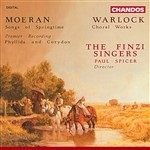 there
by Anna Crookes and Rachel Wheatley (sopranos), The Finzi Singers and
Paul Spicer (CHAN9182 [75:52] – from theclassicalshop.net,
mp3 and lossless, with pdf booklet, including texts).
there
by Anna Crookes and Rachel Wheatley (sopranos), The Finzi Singers and
Paul Spicer (CHAN9182 [75:52] – from theclassicalshop.net,
mp3 and lossless, with pdf booklet, including texts).
The lack of texts is a problem, especially in the case of Benneth
Nadelik ha’n Bledhan Nowedh. If you are wondering about the cover
shot, it’s Warlock’s monogram – real name Philip Heseltine – on the
front of his copy of Schoenberg’s Second String Quartet.
Benneth Nadelik ha’n Bledhan Nowedh is receiving its first performance
in Cornish but there are six world premiere recordings on a recent Resonus
album of Warlock’s music: RES10129 – see 2014/3.
* Even earlier than usual, I received my first two Christmas CDs for
review in mid September.
Freebie of the Month
Ernest J MOERAN (1894-1950)
Overture for a Masque; In the Mountain Country; Rhapsodies Nos. 1 and
2; Rhapsody in f-sharp
Benjamin Frith (piano); Ulster Orchestra/JoAnn Falletta
NAXOS 8.573106 [57:06] – available as NX3106 from theclassicalshop.net (mp3, 16- and 24-bit lossless) – see review – review – review – review – DL
News 2014/1 for download from classicsonline.com (mp3 only) and eclassical.com (mp3 and lossless).

 This
is the free download with this month’s newsletter from theclassicalshop.net.
If you haven’t yet signed up, it’s too late for this recording, but
it’s a free service and you can benefit in future months.
This
is the free download with this month’s newsletter from theclassicalshop.net.
If you haven’t yet signed up, it’s too late for this recording, but
it’s a free service and you can benefit in future months.
My only reservation was and is that the Naxos coupling cuts across other
recommendations, from Chandos – the owners of theclassicalshop.net –
and Lyrita.
As a freebie it comes in mp3 form but theclassicalshop.com also offer
it in mp3 (at £5.20, slightly more expensively than from classicsonline.com),
16- bit lossless (at £5.75, slightly less than from eclassical.com),
and in 24-bit, which no-one else currently offers, albeit at an expensive
£11.99.
Paul HINDEMITH (1895-1963)
Nobilissima Visione (Complete Ballet)* [44:06]
Five Pieces for String Orchestra, Op.44/4** [14:31]
Ko-ichiro Yamamoto (trombone)*; Emma McGrath (violin)**
Seattle Symphony/Gerard Schwarz
rec. Illsley Ball Nordstrom Recital Hall-Benaroya Hall, Seattle, Washington,
USA,
4, 5 and 19 May, 2011. DDD
pdf booklet included.
NAXOS 8.572763 [58:37] – from classicsonline.com (mp3) or eclassical.com (mp3 and lossless) or stream from Naxos Music Library or Qobuz.
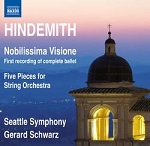 (See review by Leslie Wright – ‘Hindemith’s complete Nobilissima Visione in a fine performance’ – and Rob Barnett – ‘Hindemith done with utter
conviction and apposite style’.)
(See review by Leslie Wright – ‘Hindemith’s complete Nobilissima Visione in a fine performance’ – and Rob Barnett – ‘Hindemith done with utter
conviction and apposite style’.)
As Leslie Wright says, most listeners will probably be happy with the
Suite – about half the ballet – and there are plenty of good recordings
of this, ranging from classic performances by Ormandy on Naxos Classical
Archive (9.80241 with Symphonic Metamorphoses, Szell,
and Schumann Symphony No.1, Leinsdorf, download only) and the composer
himself (EMI, early stereo, with Concert Music, Horn and Clarinet
Concertos,Symphonia Serena and Symphony for Wind Band, download
only) to the recent Neschling (BIS-SACD-1730, with Mathis
der Maler andSymphonic Metamorposes – review and DL
Roundup 2011/1).
Equally, there is plenty of fine music in the complete ballet that is
omitted from the Suite and at the Naxos price (£4.99 from classicsonline.com)
there’s no need to hesitate. The COL mp3 is very good, the eclassical.com
lossless slightly but significantly better but, at $10.56, rather more
expensive.
RECORDING OF THE MONTH
 Sir
William WALTON (1902-1983)
Sir
William WALTON (1902-1983)
Troilus and Cressida (original soprano version, 1954, with 1976
revisions)
Cressida - Judith Howarth (soprano)
Evadne - Yvonne Howard (mezzo-soprano)
Troilus - Arthur Davies (tenor)
Pandarus - Nigel Robson (tenor)
Third Watchman - Brian Cookson (tenor)
Priest - Peter Bodenham (tenor)
Soldier - Keith Mills (tenor)
Diomede - Alan Opie (baritone)
Antenor - James Thornton (baritone)
Calkas- Clive Bayley (bass)
First Watchman - Bruce Budd (bass)
Second Watchman - Stephen Dowson (bass)
Horaste - David Owen-Lewis (bass)
Chorus of Opera North
English Northern Philharmonia/Richard Hickox
rec. Leeds Town Hall, 19-25 January 1995. DDD
 pdf
booklet with texts available
pdf
booklet with texts available
CHANDOS 2-FOR-1 CHAN241-50 [70:08 + 63:04] - from theclassicalshop.net (mp3 and lossless)
Please see full review by Rob Barnett and myself on the main MusicWeb International pages.
Aram Il’yich KHACHATURIAN (1903-1978) Spartacus
Suite No.1 [25:55]
Suite No.2 [20:35]
Suite No.3 [16:10]
Scottish National Orchestra/Neeme Järvi
rec. Henry Wood Hall, Glasgow, September 1990. DDD
pdf booklet available
CHANDOS CHAN8927 [62:53] – from theclassicalshop.net (mp3 and lossless)
Aram KHACHATURIAN
Orchestral Suites from Spartacus (Nos.1/3, 2/1, 1/4 -5) [23:04]
and Gayaneh [18:22]
Maucice RAVEL (1875-1937) Daphnis et Chloé : Suite No.2
[17:04]
St Petersburg Philharmonic Orchestra/Yuri Temirkanov
rec. Great Philharmonic Hall, St Petersburg, December 2005 (Khachaturian)
and December 2010 (Ravel). DDD
pdf booklet included
SIGNUM SIGCD310 [58:32] – from classicsonline.com (mp3)
 If
you are looking for more of the ballet than the excerpts included on
the composer’s own recording (Beulah, above) but don’t want the whole
ballet, the Chandos disc containing the three suites in powerful
performances, very well recorded, could be your ideal solution.
If
you are looking for more of the ballet than the excerpts included on
the composer’s own recording (Beulah, above) but don’t want the whole
ballet, the Chandos disc containing the three suites in powerful
performances, very well recorded, could be your ideal solution.
A word of warning: I downloaded the complete album using the Download
Manager and every track contained cracks, bangs and horrendous drop-outs.
The solution was to go back and download each track manually – at least
Chandos allow a second bite of the cherry. Another grumble: because
this is an older album, you have to re-number tracks 1 to 9 as 01 to
09 to get them to play in the right order. Albums released in the past
few years don’t present this problem but it would be a sporting gesture
if the engineers put the older ones in order to save the punters from
having to do it.

My only reservation about the fine Signum album is that I would
have preferred more of Khachaturian’s music in exchange for the Ravel.
That, too, receives a fine performance, but there’s more to Daphnis
et Chloé than this suite and I prefer to hear it complete, preferably
from Pierre Monteux and the LSO (Decca Originals E4757525, with Rapsodie Espagnole and Pavane pour une Infante défunte).
I should point out that Brian
Reinhart was less than taken with the Khachaturian; I certainly
agree with him that the recording needs to be turned up a notch or two.
I haven’t been able to hear the highly-regarded recording of excerpts
from Spartacus and Gayaneh which Kirill Karabits recorded
with the Bournemouth PO: Onyx4036 – review – download from 7digital.com.
Music for Alfred Hitchcock
Bernard HERRMANN (1911-1975)
The Man Who Knew Too Much Overture (1956) (arr J. Mauceri)*
[2:05]
Franz WAXMANN (1906-1967) Rebecca Suite (1940) (arr J.
Mauceri) [8:29]
Rear Window Suite (1954) (arr J. Mauceri) [9:32]
Dmitri TIOMKIN (1894-1979) Strangers on a Train (1951)
(arr J. Mauceri)* [8:44]
Dial M for Murder (1954) (arr J. Mauceri)* [7:48]
Bernard HERRMANN Vertigo excerpts (1958) [9:34]
North by Northwest Overture (1959) [2:54]
Psycho : A Narrative for string orchestra (1960, 1968)*[15:48]
Arthur BENJAMIN (1893-1960) arr.Bernard HERRMANN The Man Who
Knew Too Much : Storm Clouds Cantata (1934, arr J. Mauceri1956)
[10:03]
Danny ELFMAN (b.1953) Hitchcock – Music from the End Credits
(2012) [5:56]
Klaudia Kidon (soprano); Danish National Concert Choir
Danish National Symphony Orchestra/John Mauceri
rec. live DR Koncerthuset, Copenhagen, 23-24 November 2012. DDD
* first recordings
pdf booklet included
TOCCATA TOCC0241 [81:01] – from eclassical.com (mp3 and lossless) or stream fromQobuz or Naxos
Music Library.

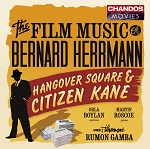 Chandos
have given us some of the film music of Bernard Herrmann (CHAN10577 [77:31] – download fromtheclassicalshop.net,
mp3, 16- and 24-bit lossless – review)
but, fortunately, nothing on that album duplicates the new, even more
enterprising, Toccata release of music by Herrmann and others for the
Hitchcock movies, much of it lovingly restored by the conductor John
Mauceri. Nor do the two Dmitri Tiomkin titles duplicate a Unicorn recording
of his music (UK2011 – also from theclassicalshop.net,
mp3 and lossless).
Chandos
have given us some of the film music of Bernard Herrmann (CHAN10577 [77:31] – download fromtheclassicalshop.net,
mp3, 16- and 24-bit lossless – review)
but, fortunately, nothing on that album duplicates the new, even more
enterprising, Toccata release of music by Herrmann and others for the
Hitchcock movies, much of it lovingly restored by the conductor John
Mauceri. Nor do the two Dmitri Tiomkin titles duplicate a Unicorn recording
of his music (UK2011 – also from theclassicalshop.net,
mp3 and lossless).
This very enjoyable new Toccata album, idiomatically performed and well
recorded, inevitably led me to the Chandos recording of music from Hangover
Square [17:05] and Citizen Kane [49:07] and an arrangement
as a piano concerto, Concerto macabre, of music from the former
[11:01], with Martin Roscoe as soloist, another of the very fine recordings
of film music made for that label by Rumon Gamba and the BBC Philharmonic.
Arnold COOKE (1906-2005)
Sonata No. 2 for Violin and Piano (1951) [22:19]
Sonata for Viola and Piano (1936-37) [21:14]
Sonata No. 2 for Cello and Piano (1980) [23:59]
Susanne Stanzeleit (violin); Morgan Goff (viola); Raphael Wallfisch
(cello); Raphael Terroni (piano)
Previously released on BMS432CD
rec. Music Hall of the Guildhall School of Music and Drama, London,
UK, 2, 9 and 16 October, 2005. DDD
World première recordings
NAXOS 8.571362 [67:33] – from classicsonline.com (mp3)
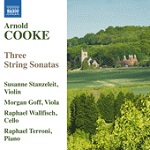 (‘This
is a fine disc of repertoire that has never been commercially recorded
before.’ Seereview by Rob Barnett and review by John France, with links to Arnold Cooke webpage.)
(‘This
is a fine disc of repertoire that has never been commercially recorded
before.’ Seereview by Rob Barnett and review by John France, with links to Arnold Cooke webpage.)
Another case of déjà-vu which began with my wondering why Naxos
had chosen to re-record out of the way British music which had already
been recorded by the British Music Society. As with the York Bowen
chamber music release, this is a reissue under licence of the latter.
Arnold Cooke’s three chamber works prove that music from the second
half of the twentieth century can sound as tuneful and lyrical as if
composed by a contemporary of Elgar. All three works are charming and
enjoyable even if they don’t seem to ‘go’ anywhere. The Kentish scene,
with church and oast-houses on the cover strikes the right tone, but
there’s power in the music, too, with nary a hint of cowpat style.
Performances and recording are very good.
Brazilian repertoire for brass quintet
Fernando MORAIS Suíte Brasileira [16:01]
Alexandre BRASOLIM Sons de São Paulo [7:28]
Raimundo PENAFORTE 46th Street [1:54]
Osvaldo LACERDA Fantasia e Rondó [6:02]
Raimundo PENAFORTE Spangled [2:30]
José Alberto KAPLAN Quinteto de Metais [6:18]
Edmundo VILLANI-CÓRTES Beiráceas [3:23]
Raimundo PENAFORTE Igor [2:40]
The São Paulo Brass Quintet
rec. Teatro Humboldt, São Paulo; no date given
pdf booklet included
BIS-8000 [46:16] – from eclassical.com (mp3, 16- and 24-bit lossless)
 As
the non-standard catalogue number indicates, this is one of BIS’s shorter
offerings that’s available only as a download; their recent Adès album
is another of these short programmes (review).
Happily BIS’s per-second charging ensures these releases are good value;
indeed $6.94 for the mp3s and $11.10 for the 24/96 flacs is a steal
when there’s so much fun to be had with this feisty fivesome. The only
composer who is familiar to me is Raimundo Penaforte, two of whose pieces
are featured in Brazil!, a most engaging collection by the Los
Angeles Guitar Quartet (review).
As
the non-standard catalogue number indicates, this is one of BIS’s shorter
offerings that’s available only as a download; their recent Adès album
is another of these short programmes (review).
Happily BIS’s per-second charging ensures these releases are good value;
indeed $6.94 for the mp3s and $11.10 for the 24/96 flacs is a steal
when there’s so much fun to be had with this feisty fivesome. The only
composer who is familiar to me is Raimundo Penaforte, two of whose pieces
are featured in Brazil!, a most engaging collection by the Los
Angeles Guitar Quartet (review).
Engagement is the operative word here too; the level of inspiration
is pretty consistent throughout, and The São Paulo Brass Quintet - formed
in 2001 – are equally captivating. The programme has been well chosen,
with just enough variety to stave off any hints of sameness. Rhythms
are infectious and intonation is rock-solid. I’m especially impressed
by the recording, which is both clear and atmospheric. Ensembles of
this kind are tough to record – all too often players are closely miked
and/or the sound has a razored edge – so kudos to the BIS team for getting
this one absolutely right.
If the results of the football World Cup have left you feeling bereft
this album will come as a very welcome pick-me-up. Great fun.
Dan Morgan
http://twitter.com/mahlerei
Jazz Recording of the Month
Legendary Recordings
Ella Fitzgerald with Louis Armstrong, Louis Jordan, etc.
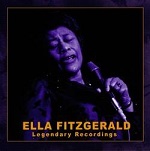 Profil
PH10008B [69:36] – from eclassical.com (mp3 and lossless) or stream from Qobuz
Profil
PH10008B [69:36] – from eclassical.com (mp3 and lossless) or stream from Qobuz
 I
can’t give you any information about the provenance of these recordings,
as there’s none with the download – it really is time that the booklet
came as standard. Other than that, I greatly enjoyed these very well
transferred recordings.
I
can’t give you any information about the provenance of these recordings,
as there’s none with the download – it really is time that the booklet
came as standard. Other than that, I greatly enjoyed these very well
transferred recordings.
One other small criticism is that there’s not much of the darker side
of Ella Fitzgerald here – plenty of the likes of Puttin’ on the Ritz and I’ve got my Love to keep me warm (tracks 1 and 2) but nothing
darker than Miss Otis regrets (track 7). Many of Ella Fitzgerald’s
fans will miss songs like Love for sale. Still, with thousands
of alternatives, it’s not too difficult to find what you want, as on The complete Ella in Berlin (Universal/Verve – stream or download
from Qobuz).



 All Nimbus reviews
All Nimbus reviews








